Lowriders Are High Art at the Petersen Museum's New Exhibit, 'Best in Low'
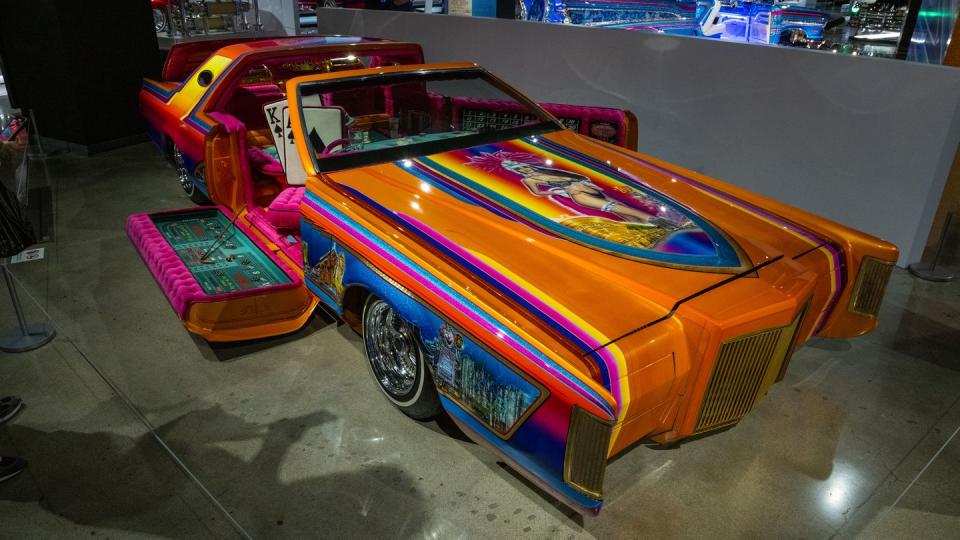
If you're lucky, you live in a town with a regular lowrider cruise, so you're familiar with the unexpected pleasure of seeing something glittering and striped in the next lane suddenly lift up like a stinkbug and drop low enough to drag sparks across the intersection. Lowriding is a community activity like no other automotive subculture. The cars aren't built to be lightweight or quick in the canyons. They aren't for early morning drives or secret late-night meet-ups; they're designed to turn heads on the main street in town during prime time. The goal is never to cross the line first, but to do it with the most style. At their most basic, lowriders are conversation starters; at their highest level, they are showstoppers. All of which makes lowrider culture perfect for a museum exhibit, where those familiar with the art form can appreciate the chance to look more closely at cars they've only seen in motion, and those new to the scene can marvel, slack-jawed, at the incredible imagination, artistry, and history that goes into making the perfect lowrider.'=
The new exhibit, "Best in Low," at the Petersen Museum in Los Angeles is not the museum's first look at lowriders, but it is its best. Walking through the gallery is like visiting the gemstone section of a natural history museum. Everything is sparkling and glowing, and a person could spend a whole day on a single car and not see every magical detail.
"Our first show was focused on community, car clubs," said Denise Sandoval, a professor of Chicana and Chicano studies at Cal State Northridge and a multi-time curator/consultant to the Petersen for its lowrider shows. "The second one was how lowriders fit in LA history, but this one is really focused on craftsmanship. We look at hydraulics, engraving, painting, upholstery. The goal is to give recognition to a community that doesn't get appreciation for its craftsmanship." Sandoval also mentioned that the new exhibit makes space for lowriders built by women, as well as builds not only from other states, but from overseas as well. "The two Japanese cars are not to be missed," she advised. We can vouch for that. Takahiko Izawa's completely engraved '58 Impala was mind-blowing, as was Hisashi Ushida's golden '54 Chevy, "Sphynx."
Best in Low opened May 12, 2024, with a cruise-in on the roof and a panel discussion with some of the builders. It was a packed show, with an hour-long wait for tacos and a crowd around the cars, but we managed to sneak in early and get some shots of the exhibits as well as have a few conversations with some of the owners. Click through the gallery for a taste, and if you're in Los Angeles within the next year, stop by and see it for yourself. The show is on display until the spring of 2025.
Early lowriders were called "bombs" and created from '36 to '54 Chevy models like this '47 Fleetline built by Matt Sherman.
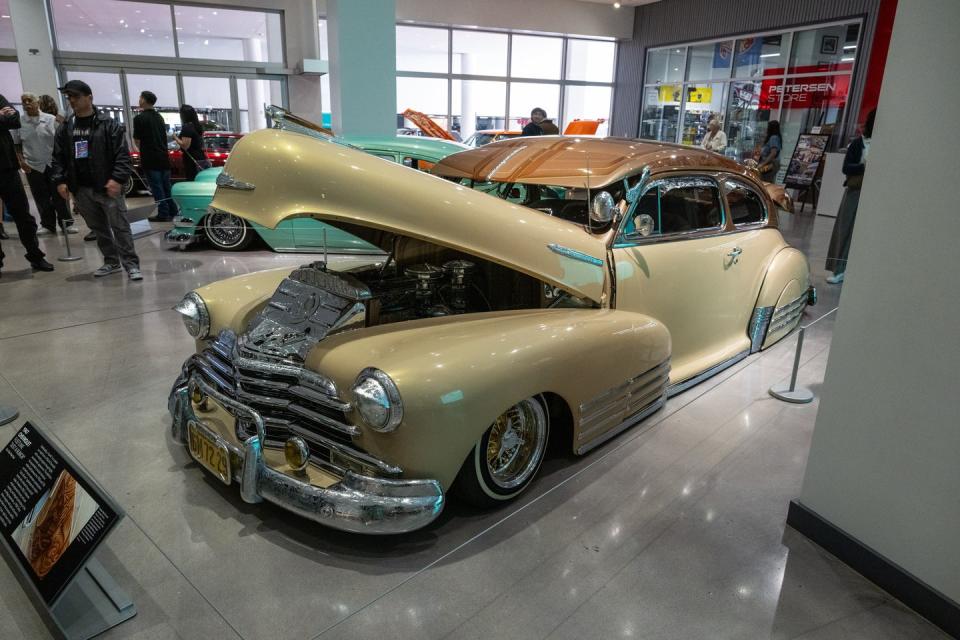
Never walk past a lowrider without stopping to examine the details. No component is too small or too unimportant to get modified.
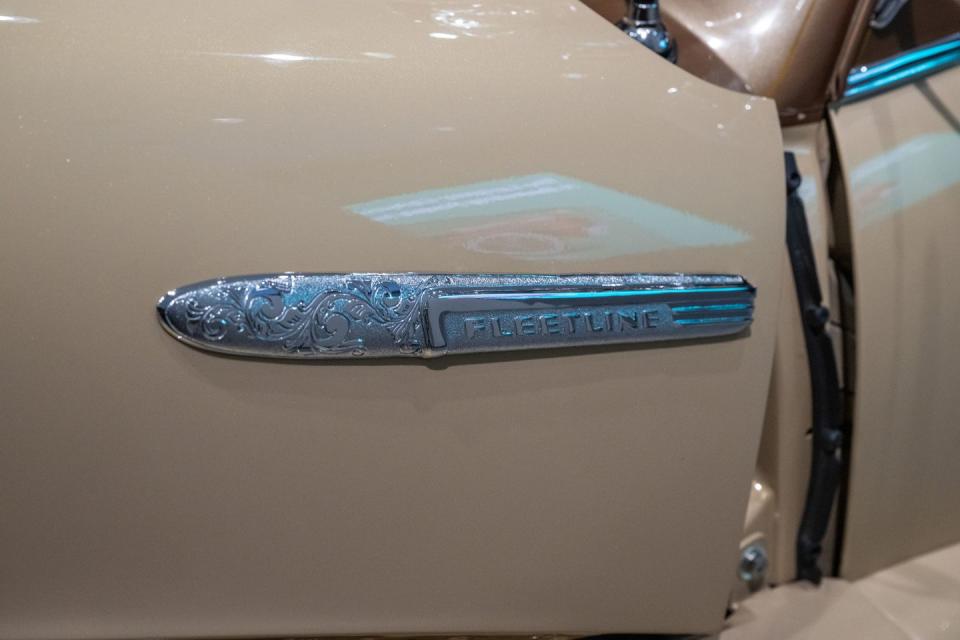
Proving the earlier point: door handles, chrome bezels, badge plates, everything is a canvas to the lowrider artist.
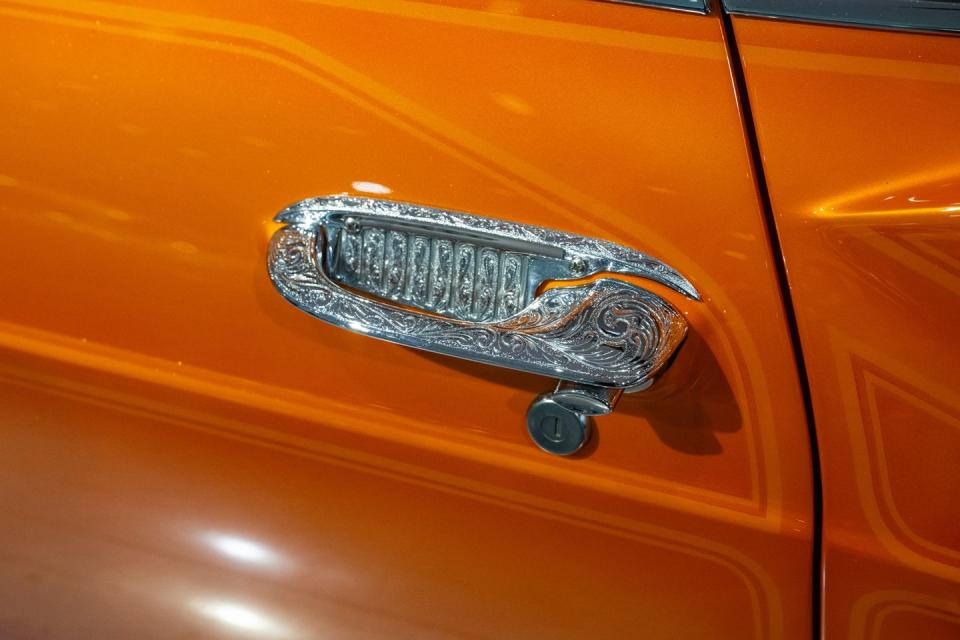
California gets credit for much of lowrider culture, but New Mexico has its own traditions, and many of the cities there have been friendlier to lowrider cruises than those in California. This is Frank Arredondo's '65 Impala.
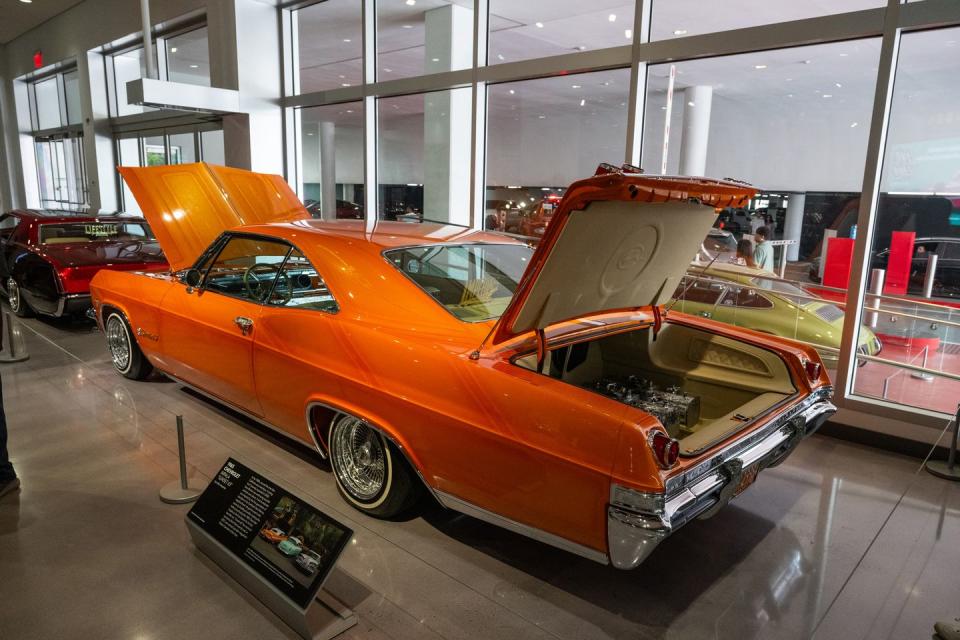
The trunk of Arredondo's "Sunset 65" Impala, showcasing the magic behind its moves.
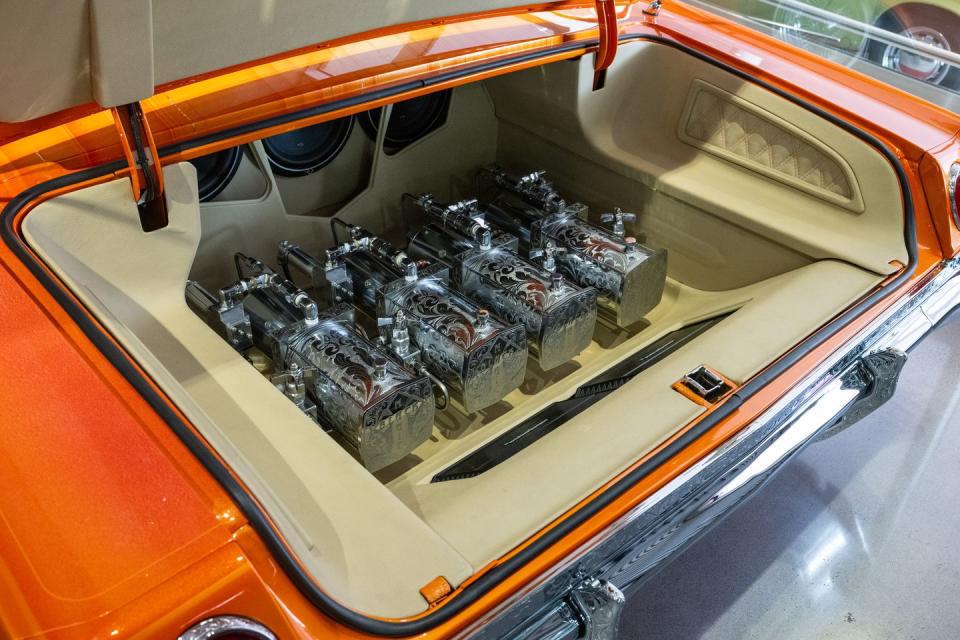
There's an obvious link between the line work of lowriders and that of tattoo, so it should come as no surprise that inker to the stars, Mister Cartoon has an history and interest in lowriders. This is his '59 Impala, "Penny Lane."
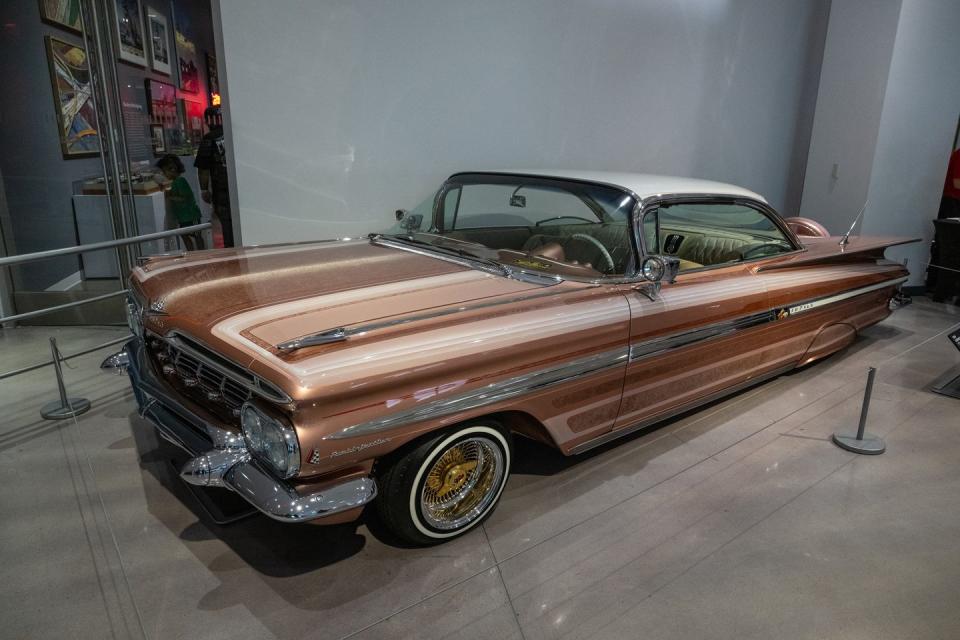
At a certain point, a lowrider show car becomes a sculpture rather than transportation. We wouldn't trust the brakes here on a 100–0 stopping test, but they sure look amazing on Matias "JR" Zamora's '59 Impala.
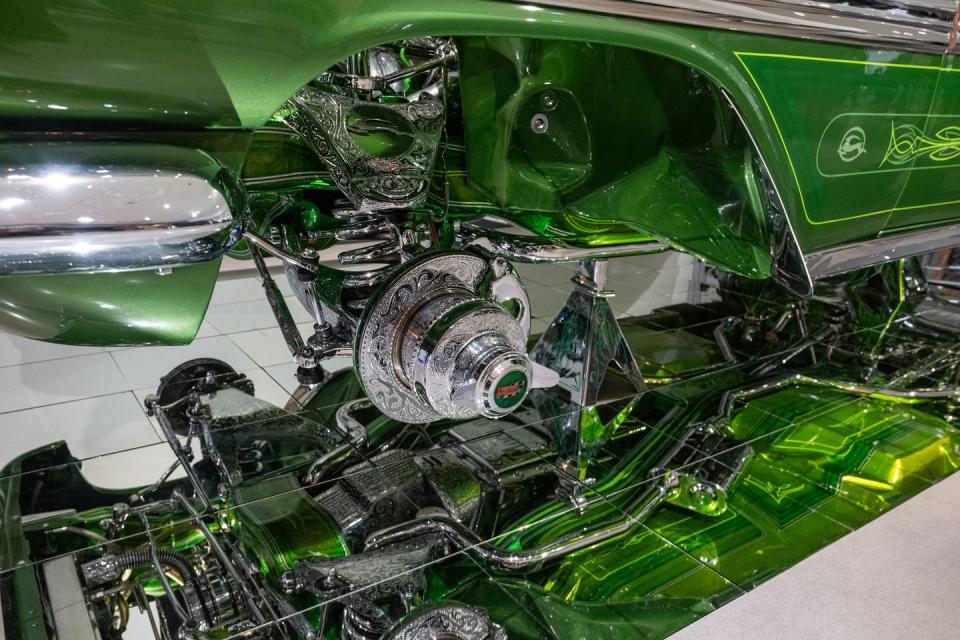
The roof and interior of Zamora's Impala, showcasing the detailed paintwork and matched upholstery.
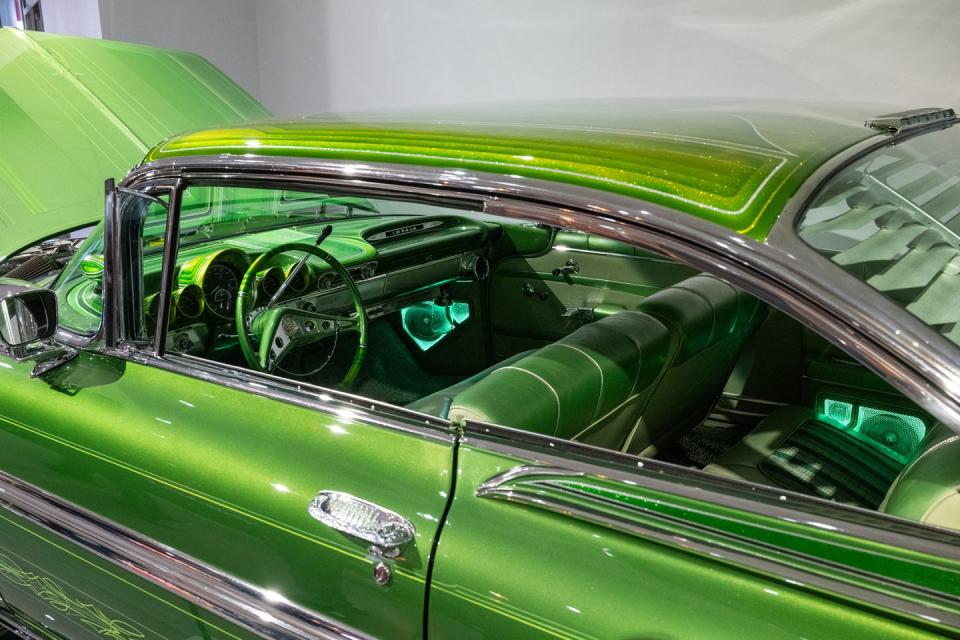
This is our personal favorite from the show, not only for its unexpectedness (a 1980 RHD Corolla is not the first car you think of for a lowrider) but also because it has an incredible story of being lost and found again, 28 years after it was built.
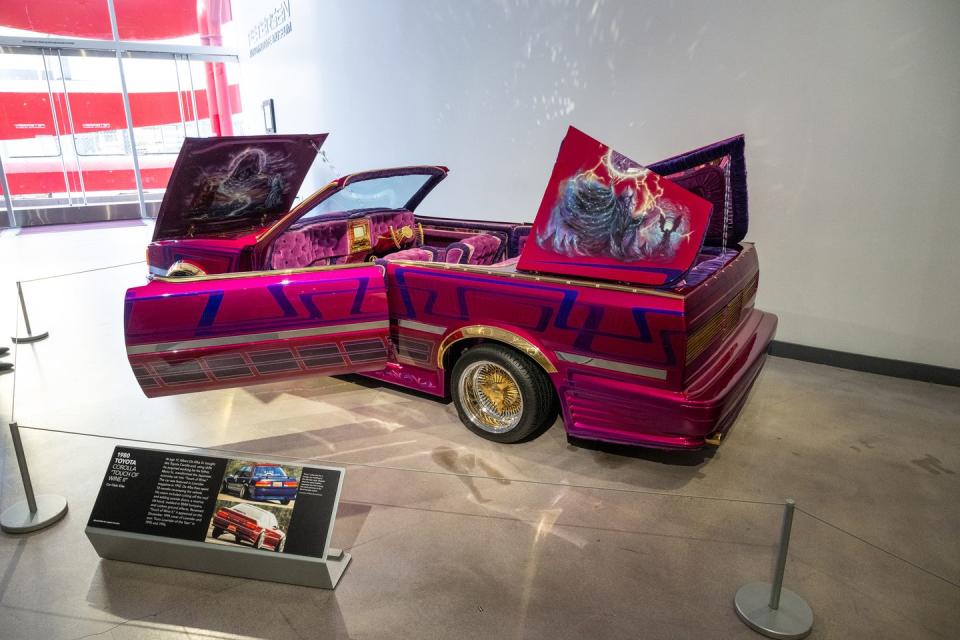
The decklid on the De Alba Corolla, a masterpiece of late '70s van influence on lowrider design.
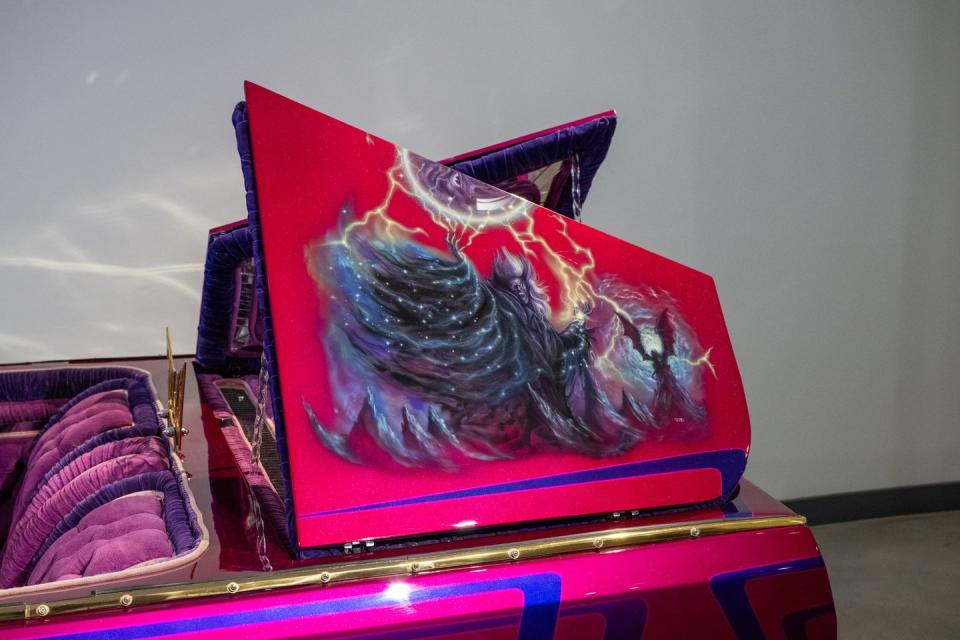
Albert De Alba Sr. bought the '80 Corolla when he was 17 and began its transformation into a lowrider. It made Lowrider magazine in '92, but De Alba wanted to take it further and completely revamped it, removing the roof and adding the suicide doors, the body modifications, and the wizards.
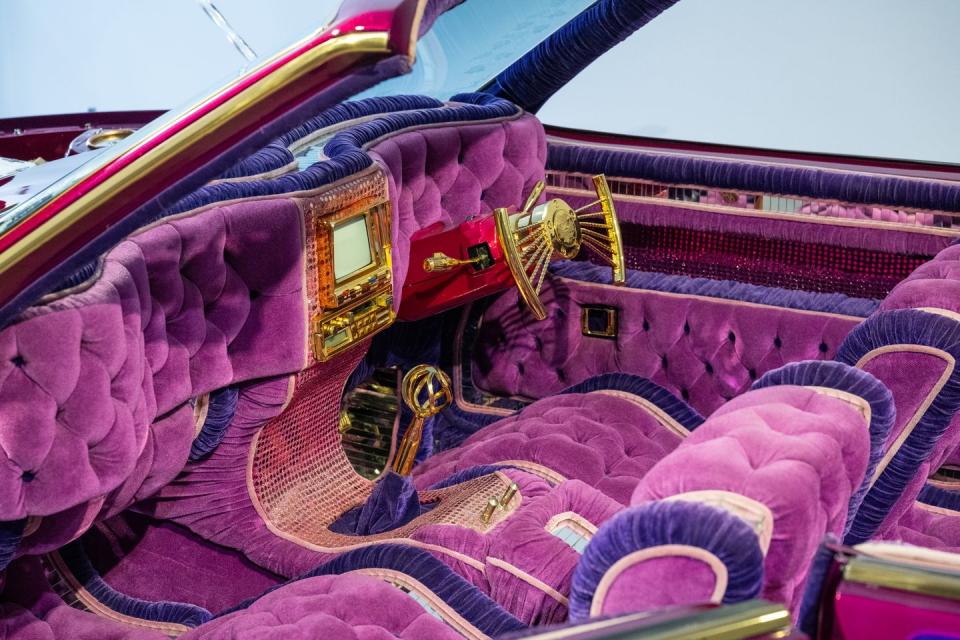
De Alba sold the car in 1997 and lost track of it in the 2000s. His son tracked it down in 2021, and put De Alba in touch with the owner. "It was the hardest buy of my life," he says. "He knew I wanted it and he didn't make it easy." De Alba finally rescued the car from the dusty warehouse where it was stored with boxes in the engine bay and four flat tires. "My son rode home in the hospital from that when he was born [version 1]."
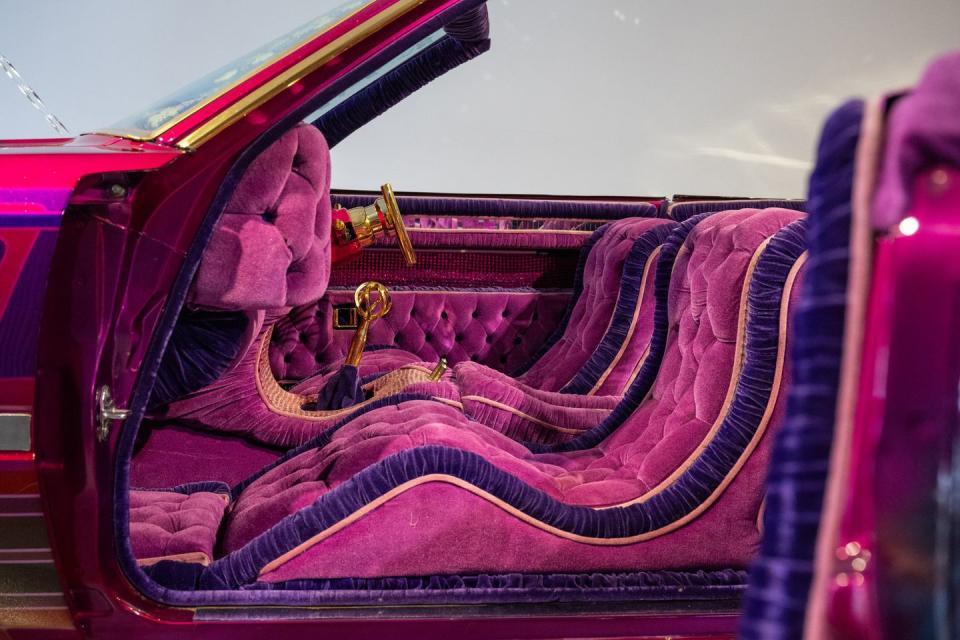
Back at home, the work began to restore Touch of Wine II to its former glory. De Alba says he came out to find his son (also a painter) working away to polish the clear with a very fine-grit paper. "I told him, 'That's old school paint, you're just tickling it, get some real grit to cut that down.'"
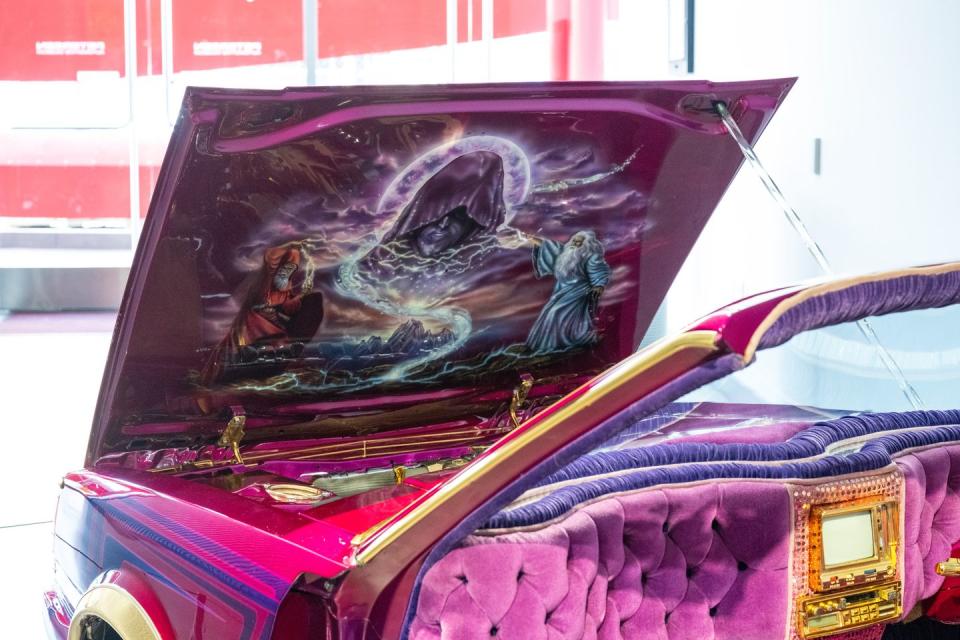
Rohan Izawa Art in Japan has perfected a method of engraving layers of primer and then painting the carved surfaces with a metallic paint that gives the impression of a bare metal body. Follow them on Instagram to see the process in action.
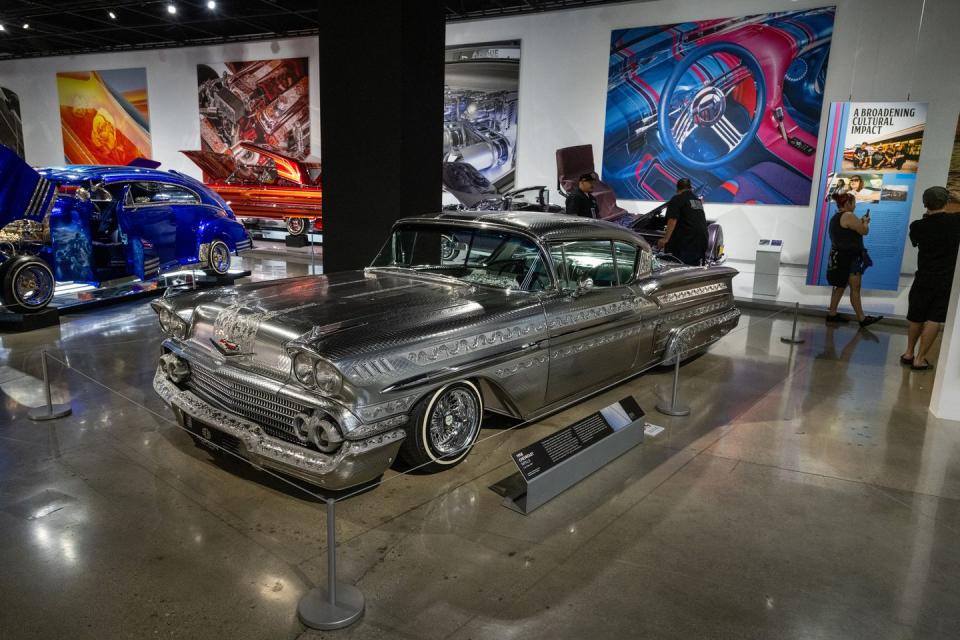
On the more subtle side of lowrider design is Tina Blankenship-Early's '66 Caprice, which transitions in different lights between blue and lavender. In 2012, Blankenship-Early was the first woman inducted into the Lowrider Hall of Fame.
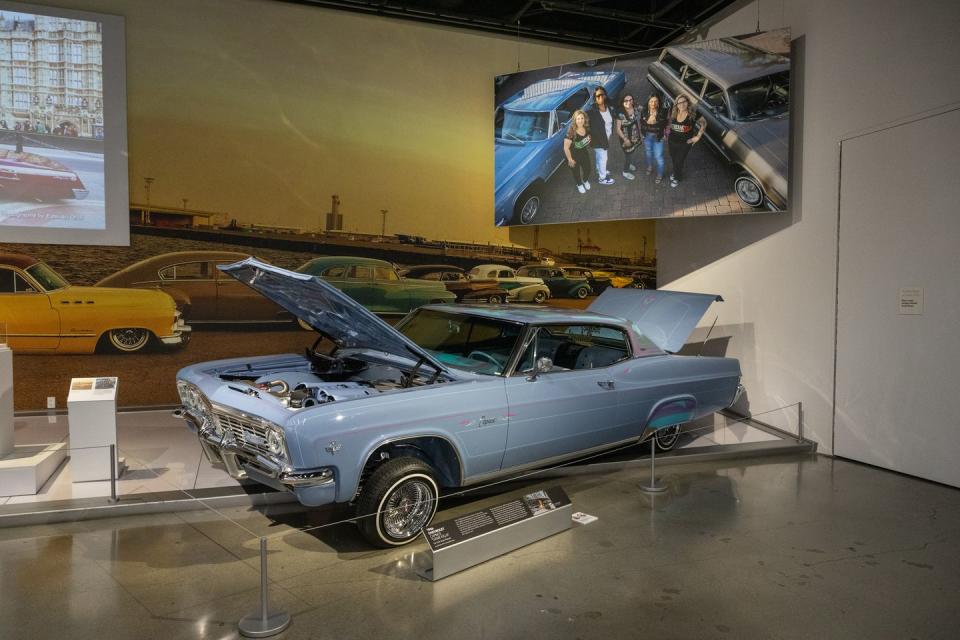
A look at the delicate details on the roof of Blankenship-Early's "Game Killah."
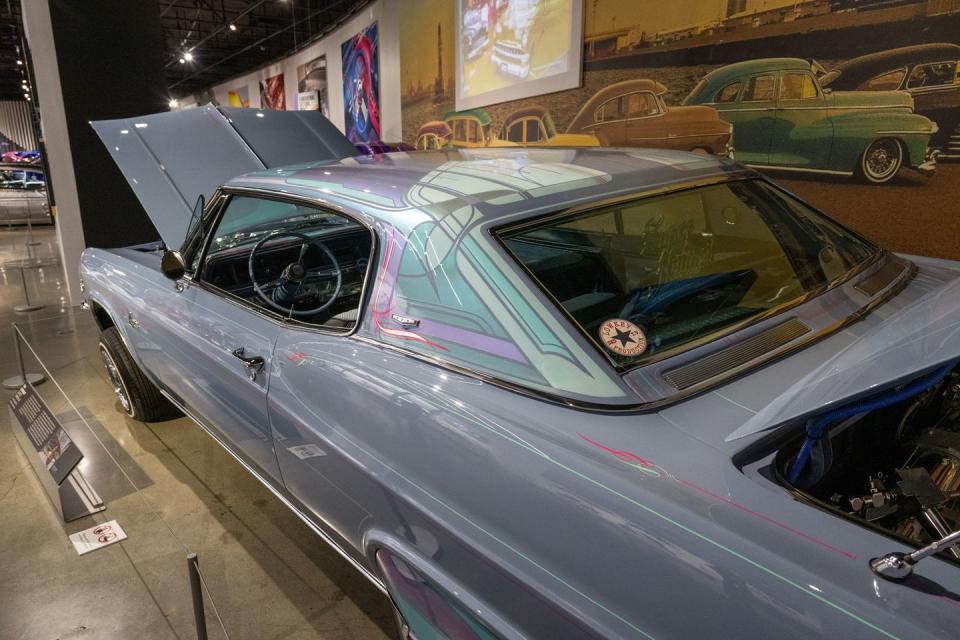
It is a known fact that a pinstriper will practice their craft on any surface that holds still, and the same is true for lowrider artists.
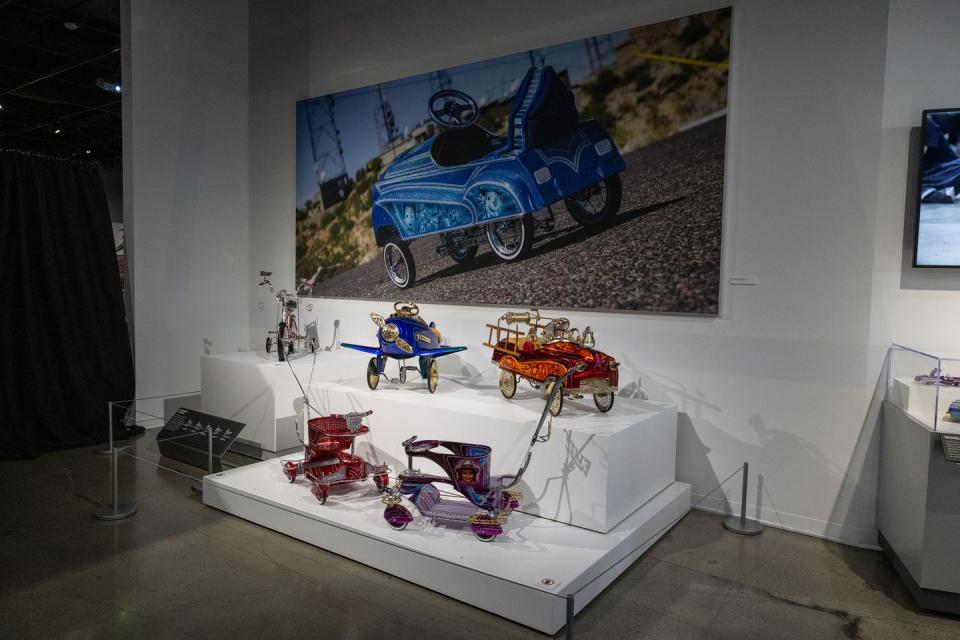
Pedal cars, toy cars, toy planes, bicycles, everything deserves the lowrider treatment.
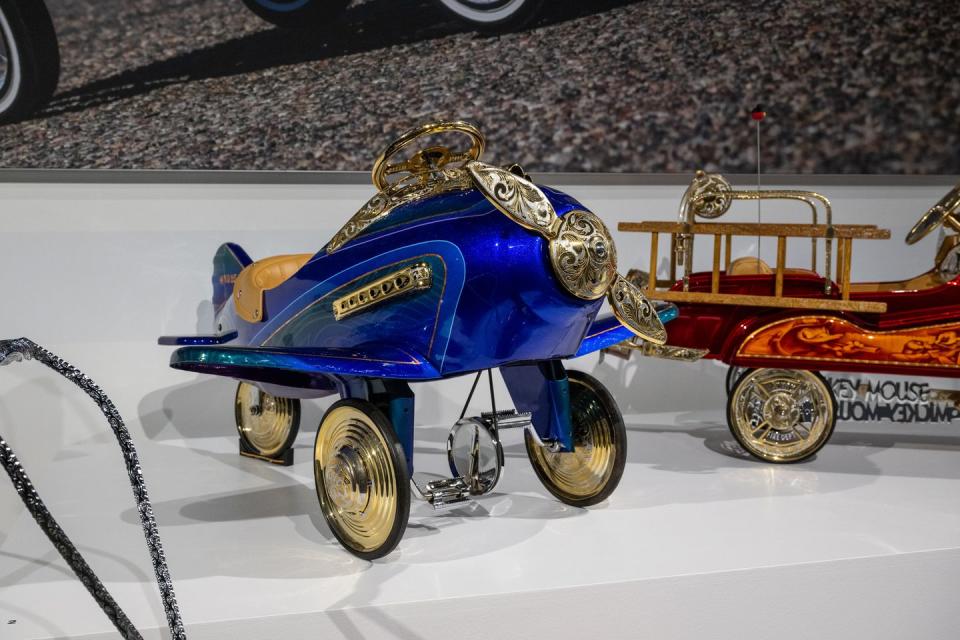
When you can't afford the full-size car, take it down a notch.
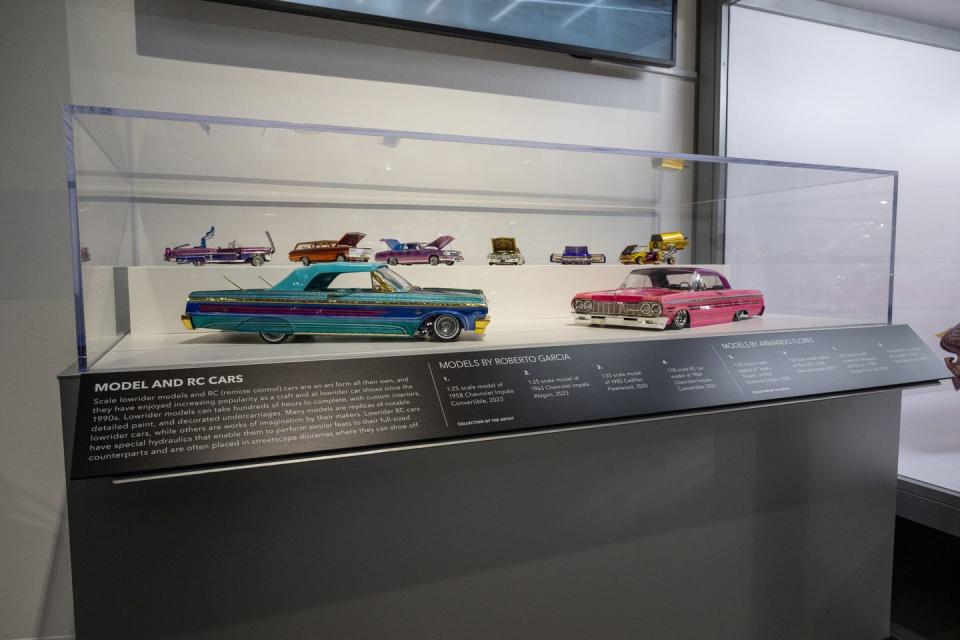
Lowrider bicycles and motorcycles also get their place in the Petersen exhibit.
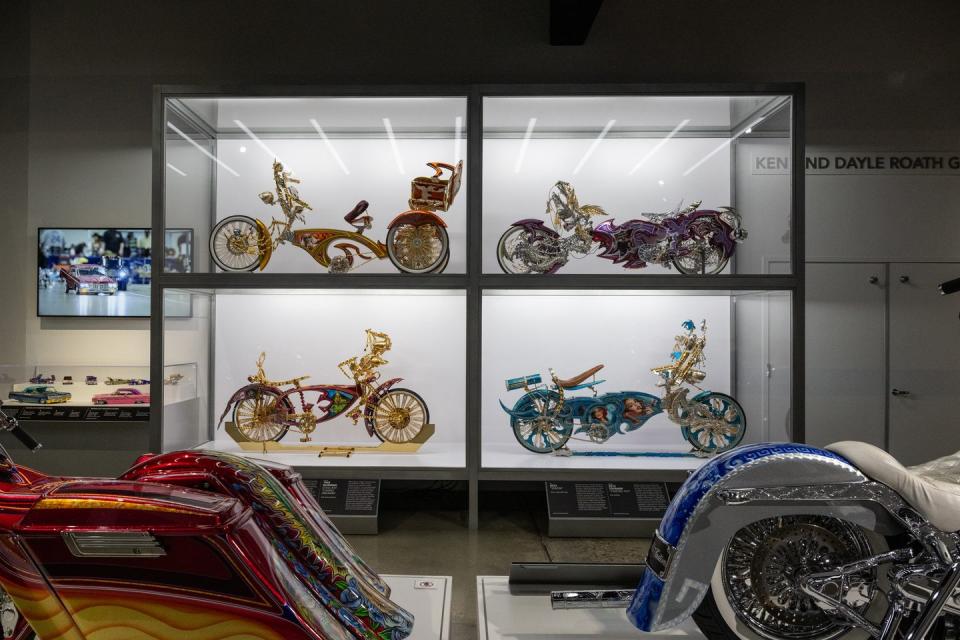
Take me to church...
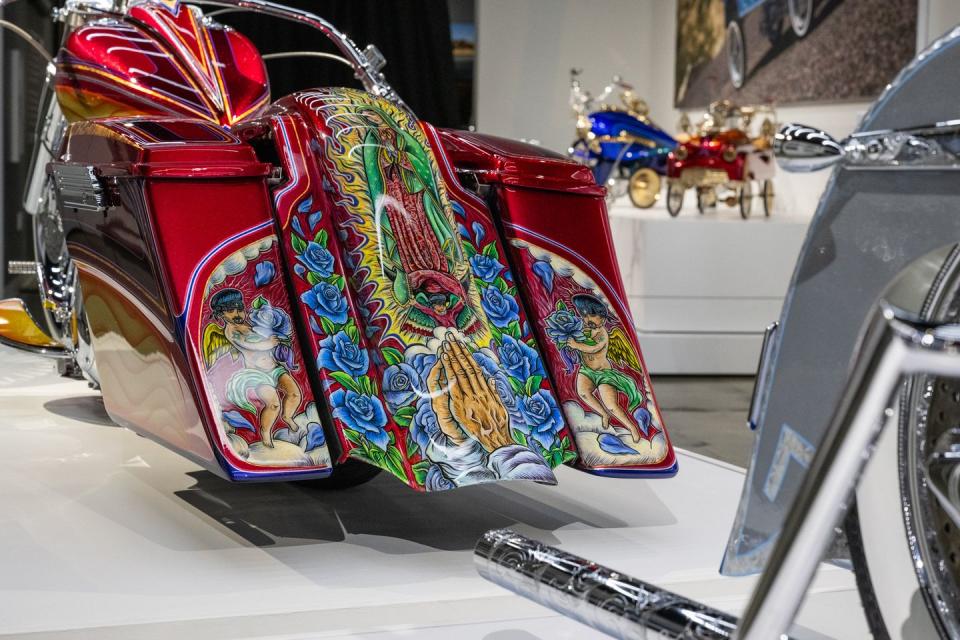
All the components of a lowrider: the chrome, the stance, the paint, and the upholstery, just on two wheels.
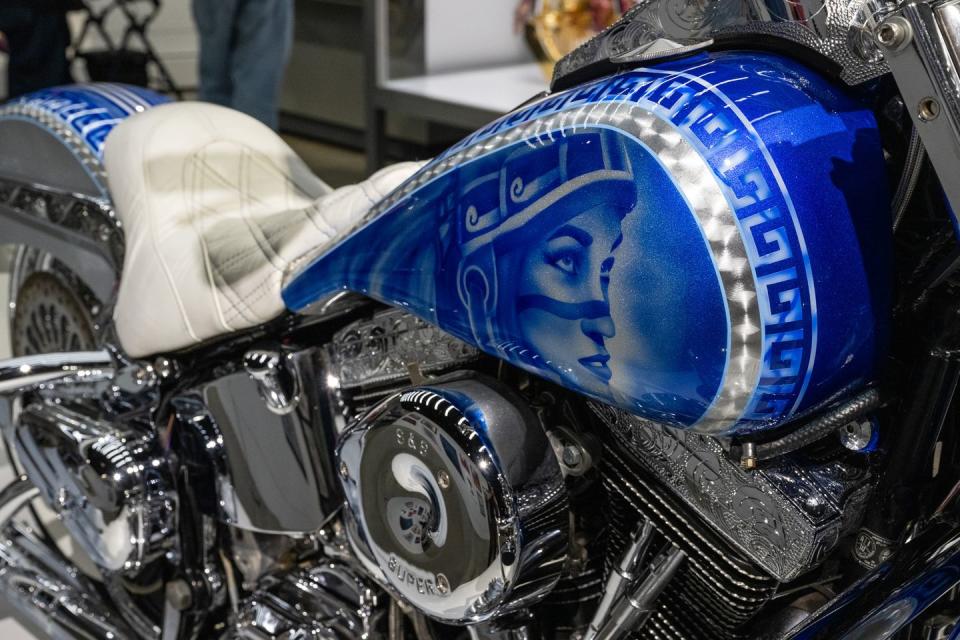
Not for delivering newspapers on.
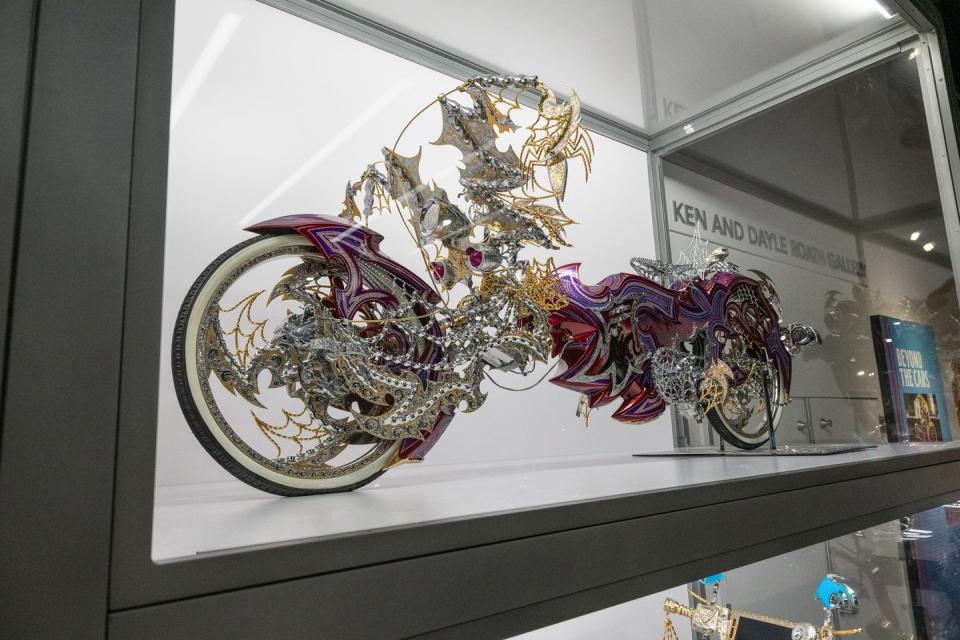
The leatherwork showcases another traditional craft.
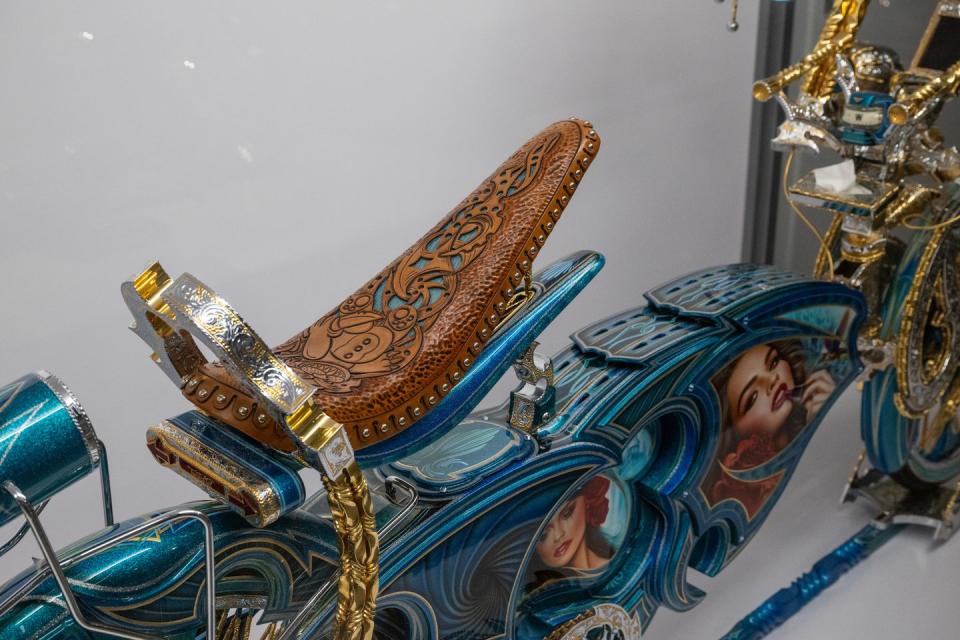
There are no anti-cruising laws in miniature-town. The full-size version of this car, "Sphinx," sat on the other side of the room.
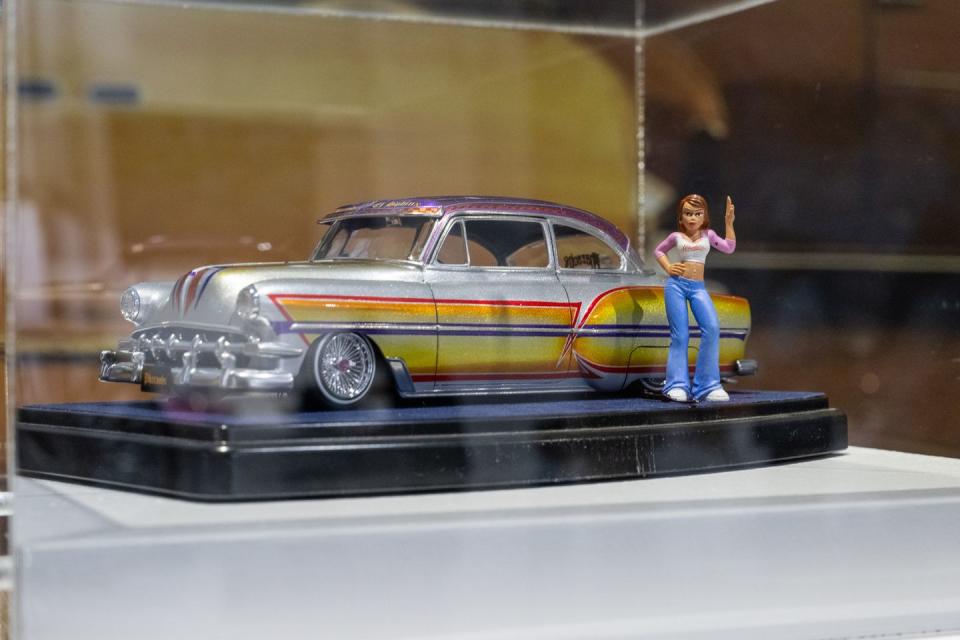
As promised. Hisashi Ushida's 1954 Chevy. Ushida runs one of the top lowrider shops in Japan.
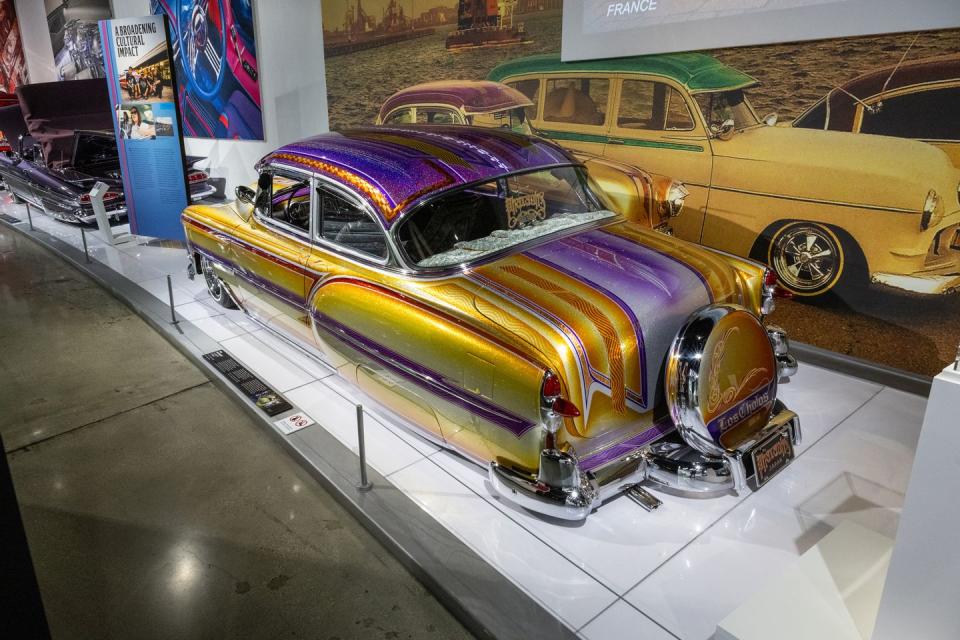
The backside of the Izawa Impala.
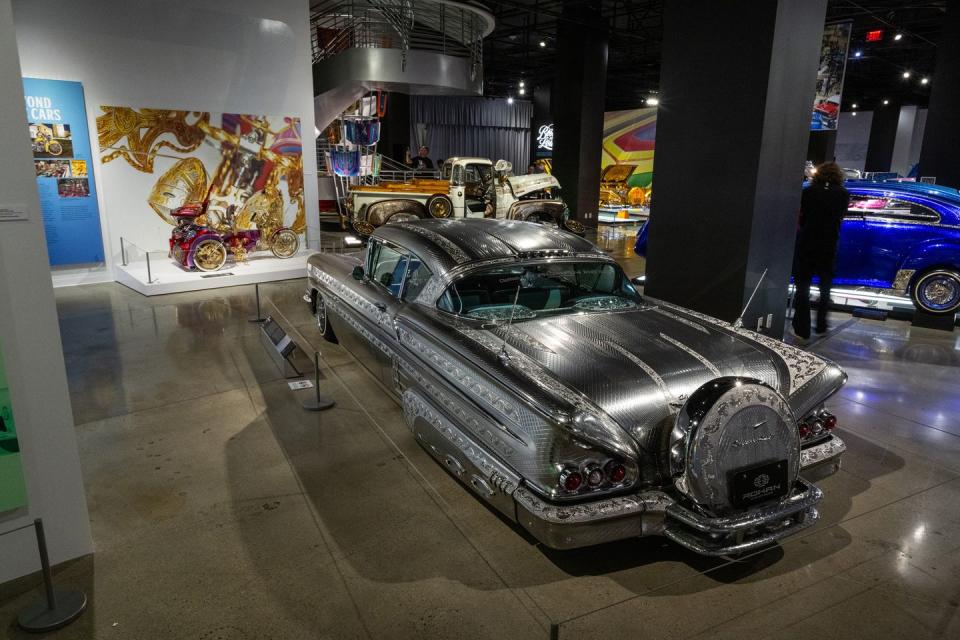
Even up close it's hard to believe that's a painted surface.
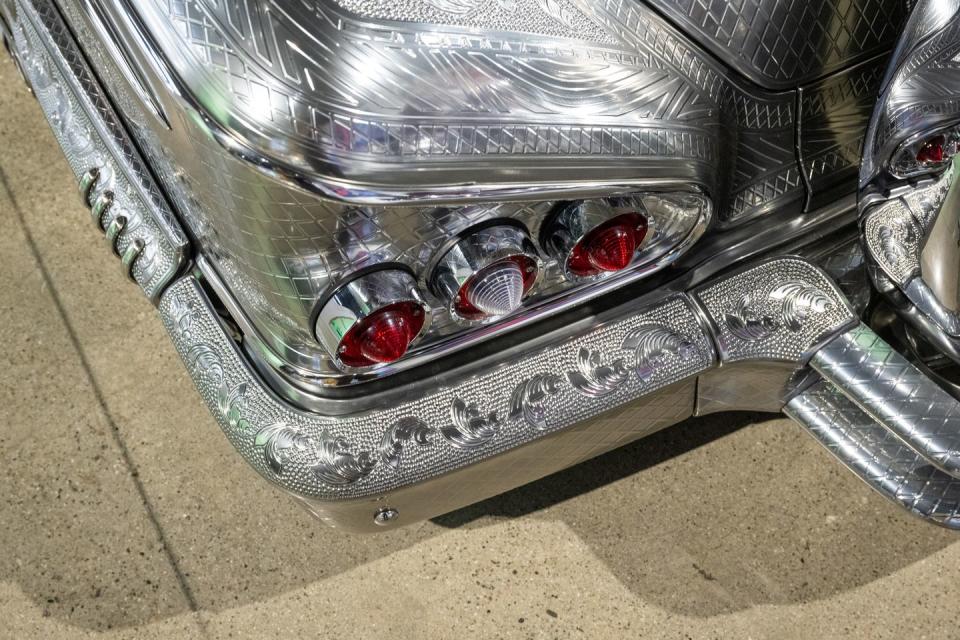
One more, for the marvel of it all.
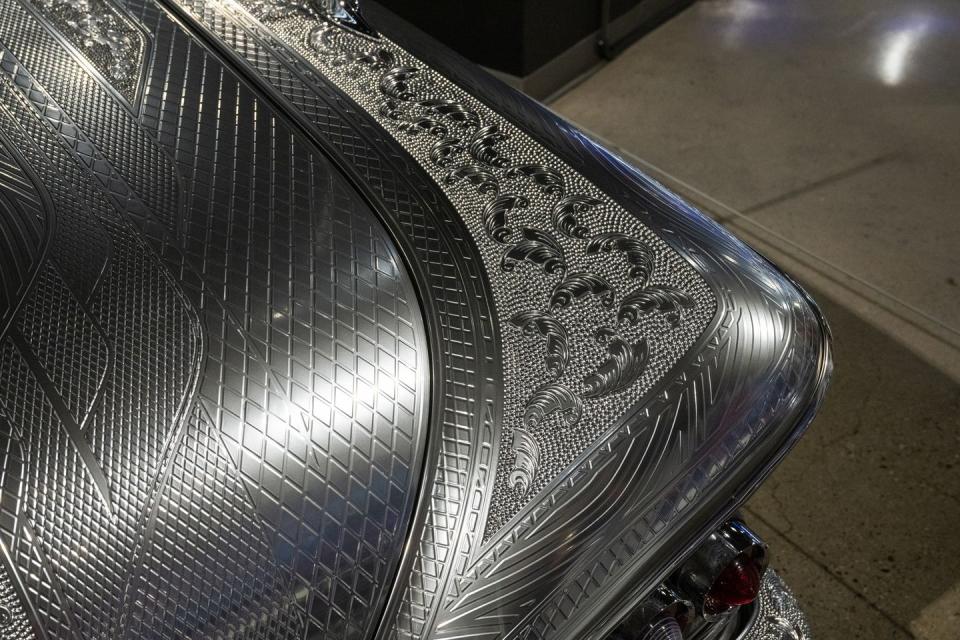
You're gonna have to find somewhere else to put your luggage.
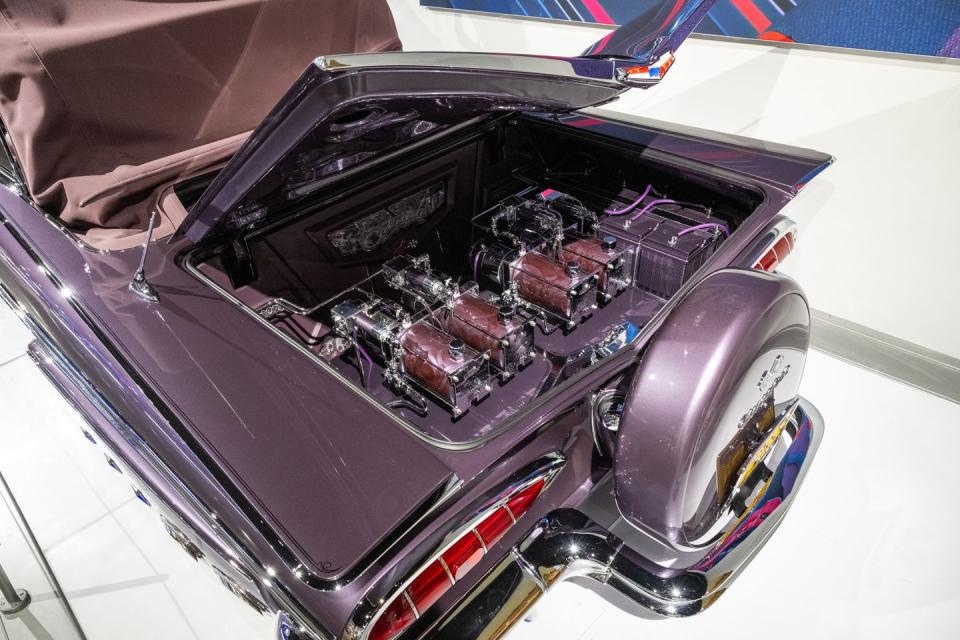
You can't look at a lowrider from just one angle. Every step uncovers a new bit of artistry.
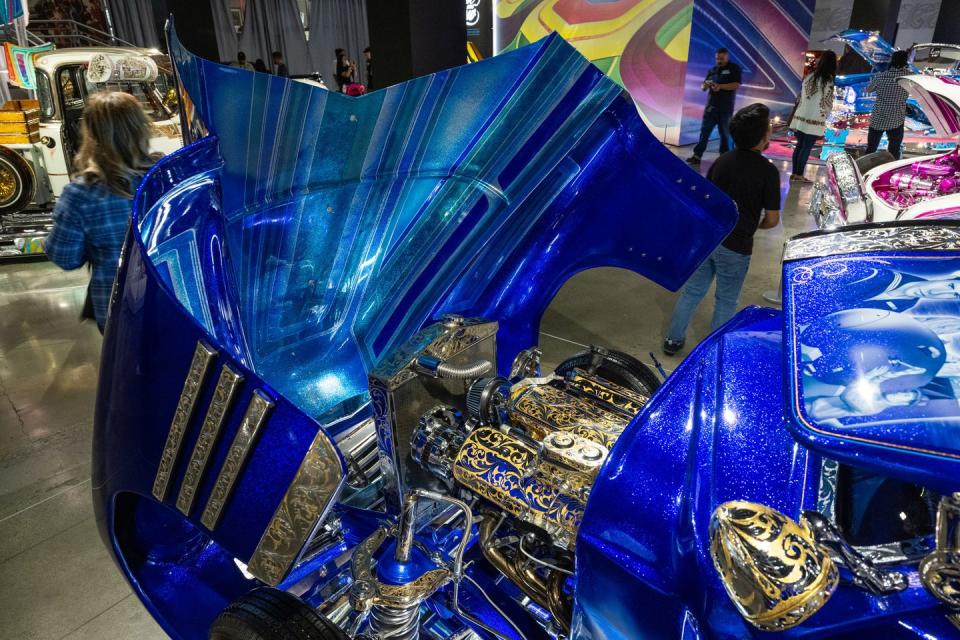
Details on Anthony and Ralph Fuentes's '59 Impala, "La Catrina."
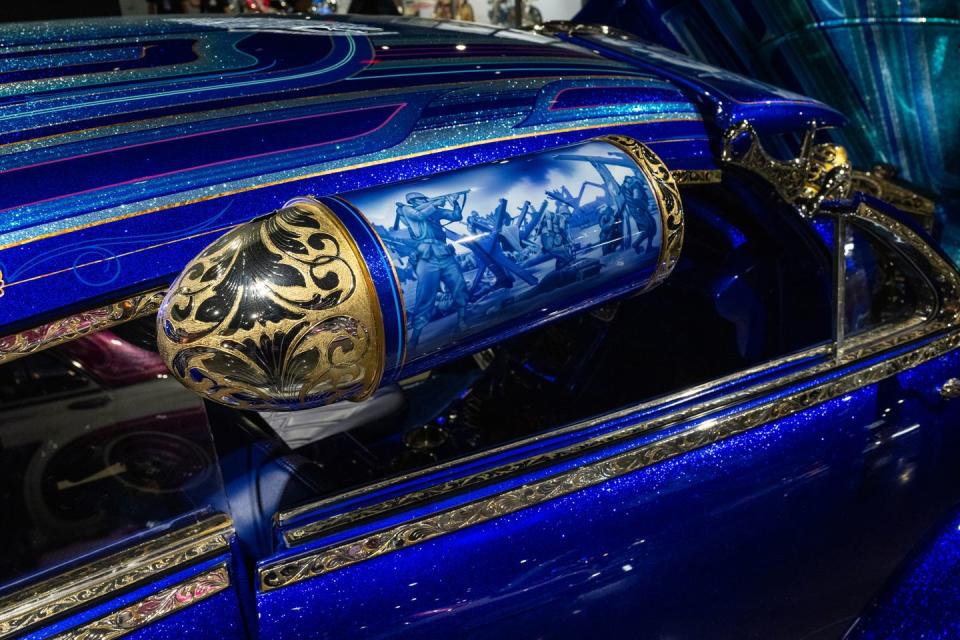
While the details rule the show, it's important to step back now and then to get an appreciation for the overall stance and impact these cars have.
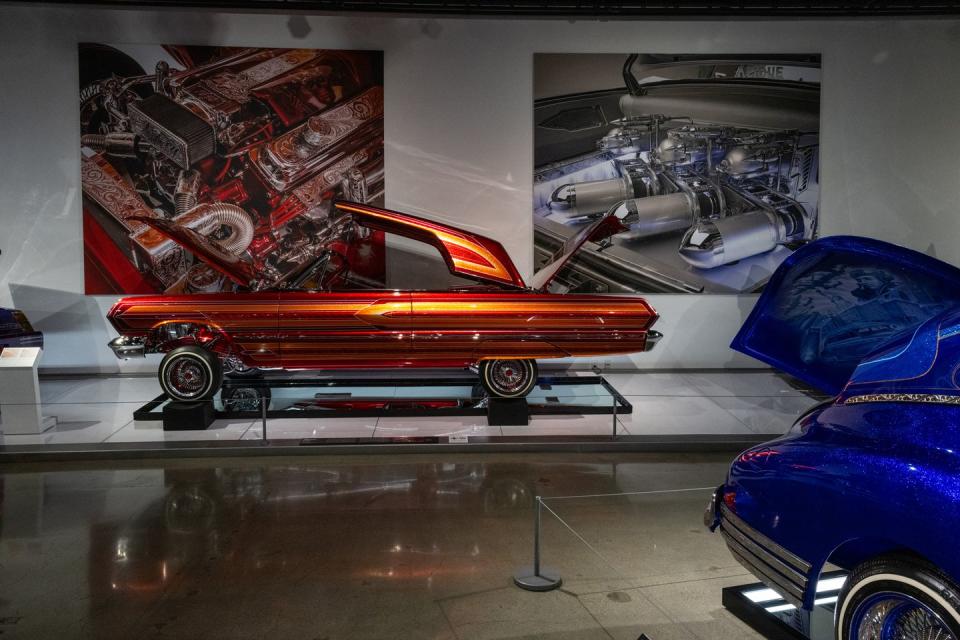
Lowriders are shown in two important ways: in motion at cruises and meet-ups, and on display at lowrider shows, where the setup for the display can be as elaborate as the car itself.
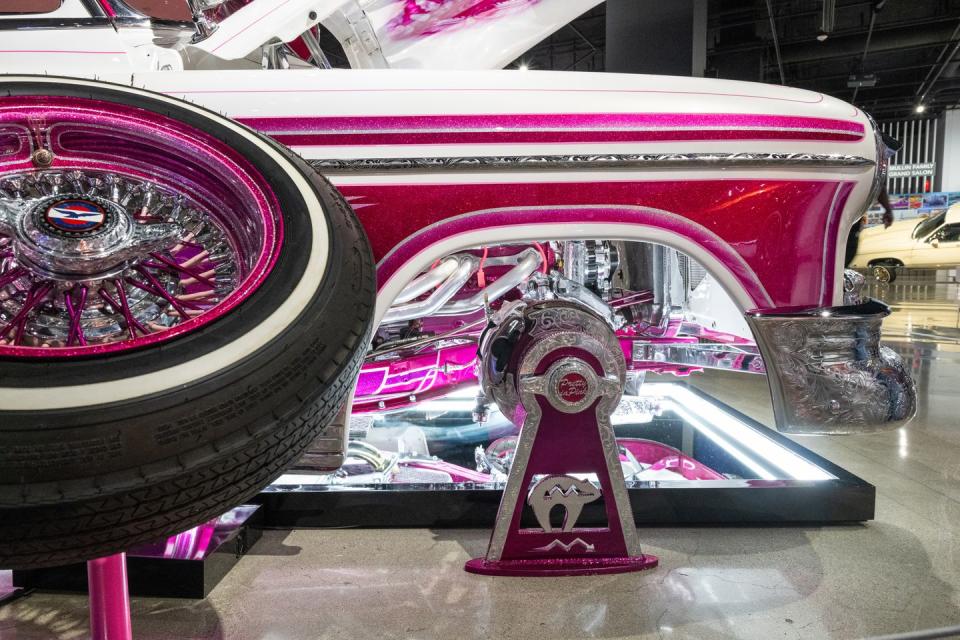
Bernardo Casian prefers the older "bomb" body styles, like this 1950 Chevy Deluxe, "Pretty in Pink."
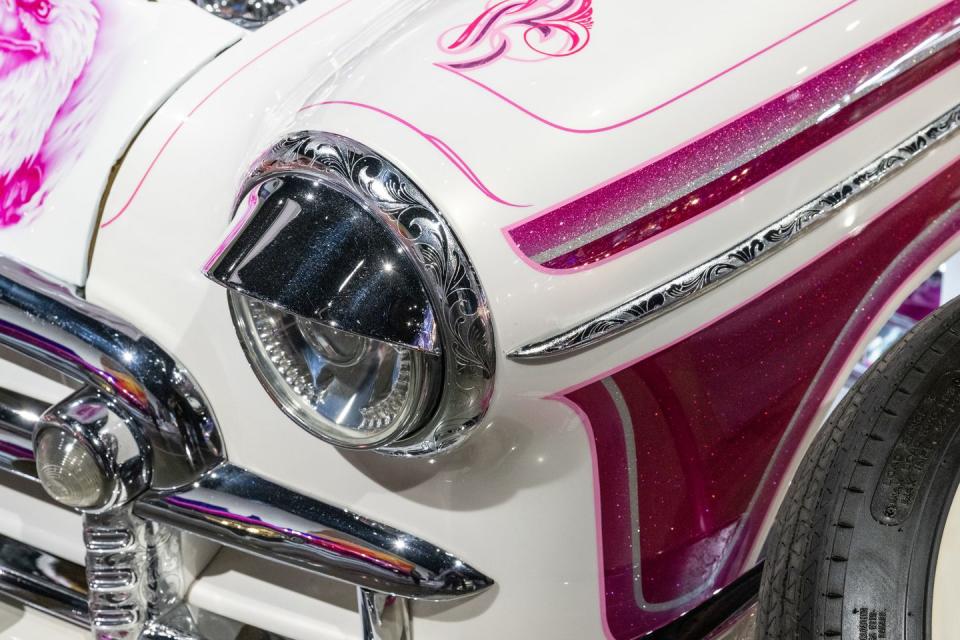
The display for Bobby Garza's "Double Trouble" is outrageous, with props and lighting, all to show off the car's incredible pinstriping and silver leaf. Not for nothing has Garza won "Lowrider of the year" three times running.
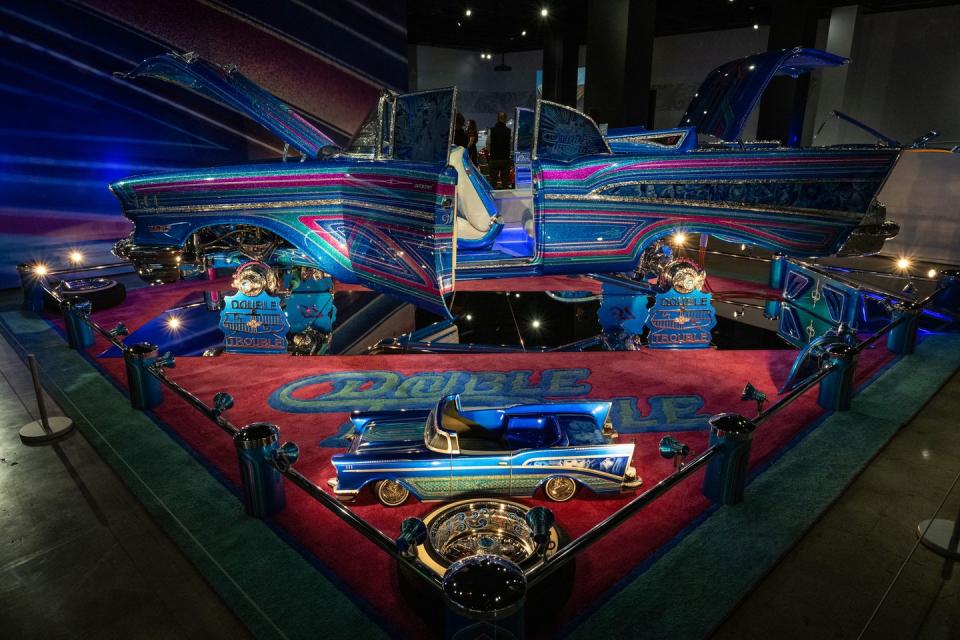
Take a second to admire how the stripes turn the corner on the door and never waver.
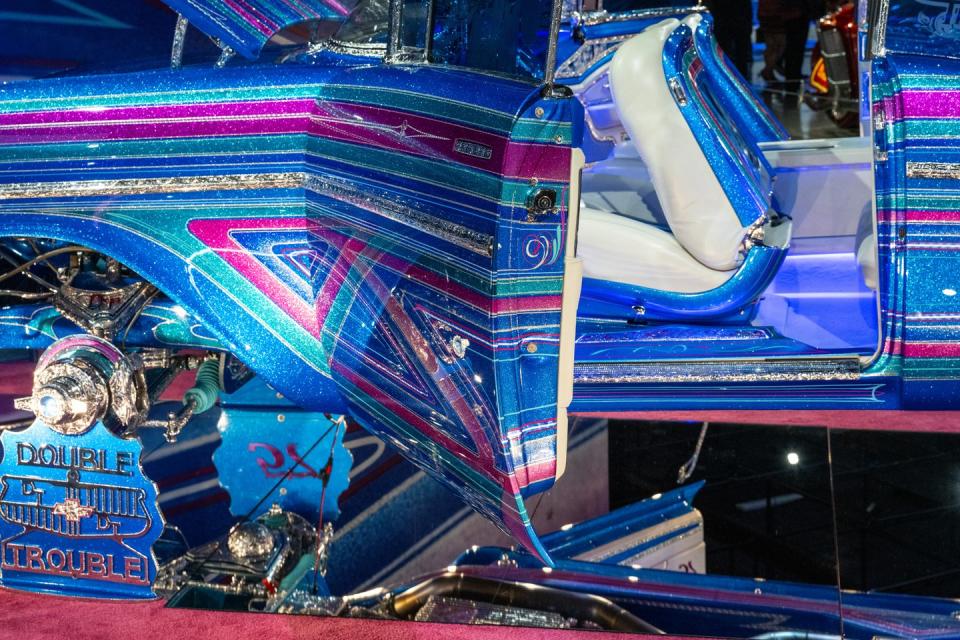
If there is any disappointment in the Petersen show, it's that there aren't any cars in motion. Still, there is a section devoted to hydraulics with a filmstrip playing videos of drops and jumps.
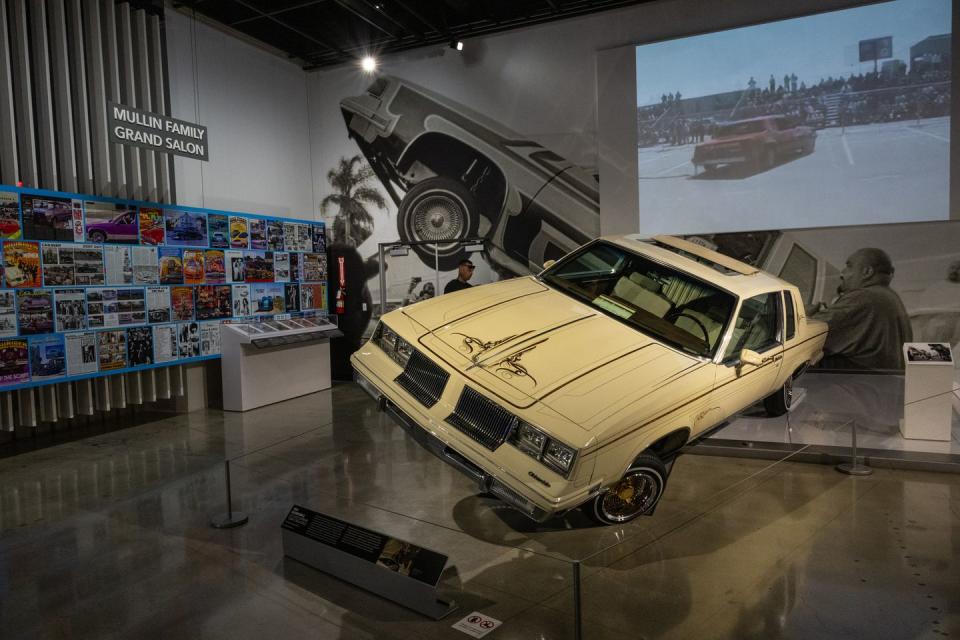
Neon explosion.
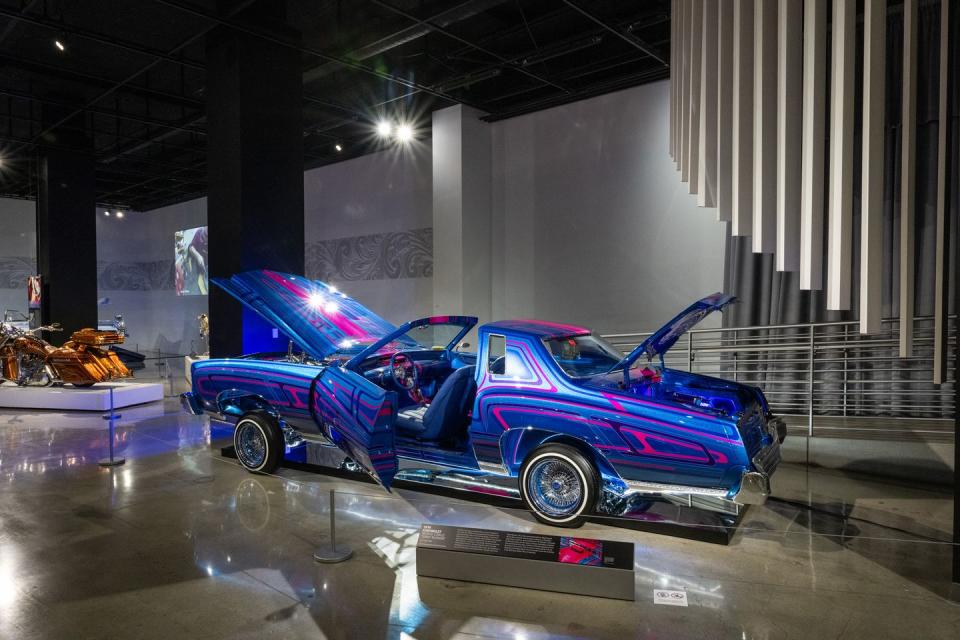
Talk about a show car, it's a whole Vegas casino.
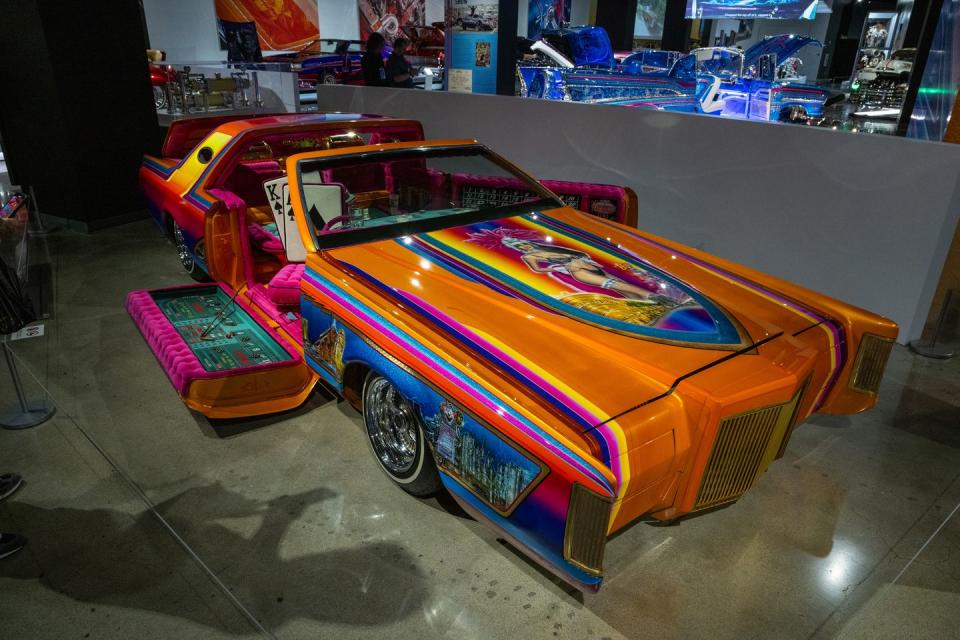
Lowriding is a family tradition, and many of the cars in the collection are built by brothers, by spouses, or by second- or even third-generation children. Such is the case with "Dead Presidents," a '58 Impala painted by Albert De Alba Jr. His father's cars are also in the show.
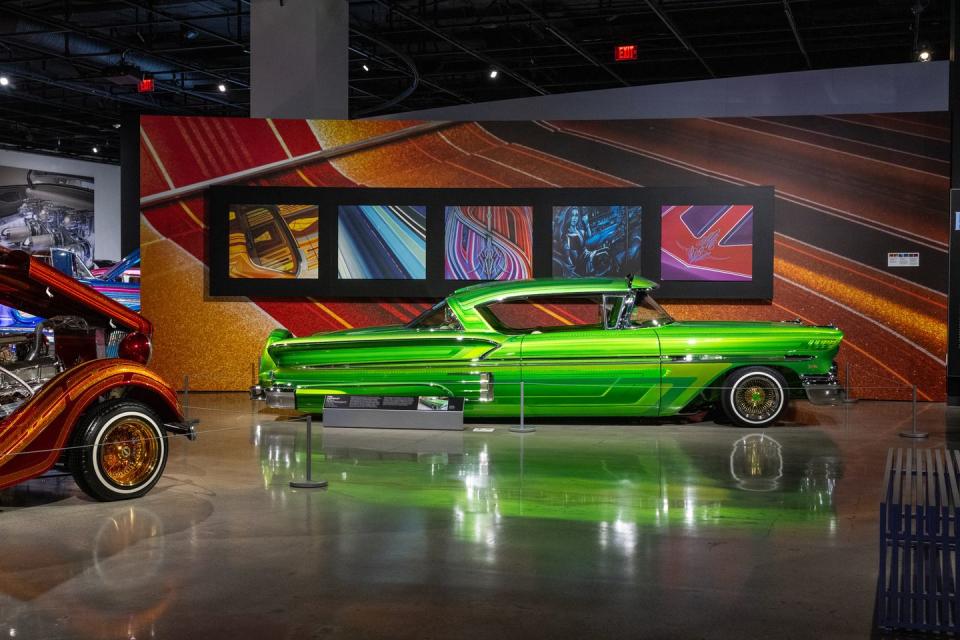
Details on "Dead Presidents."
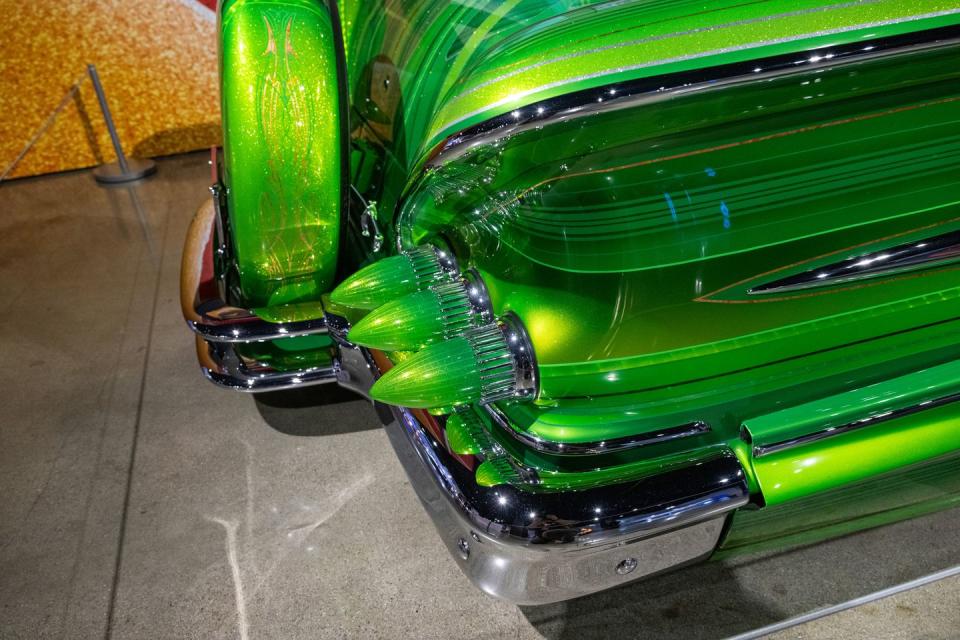
Engraving has its roots in Mexican silver work and even older Spanish metalwork. It's been a part of lowriders for decades, but only recently has started to weigh with show judges the way paint and upholstery does, so we're seeing more use, and in more places.
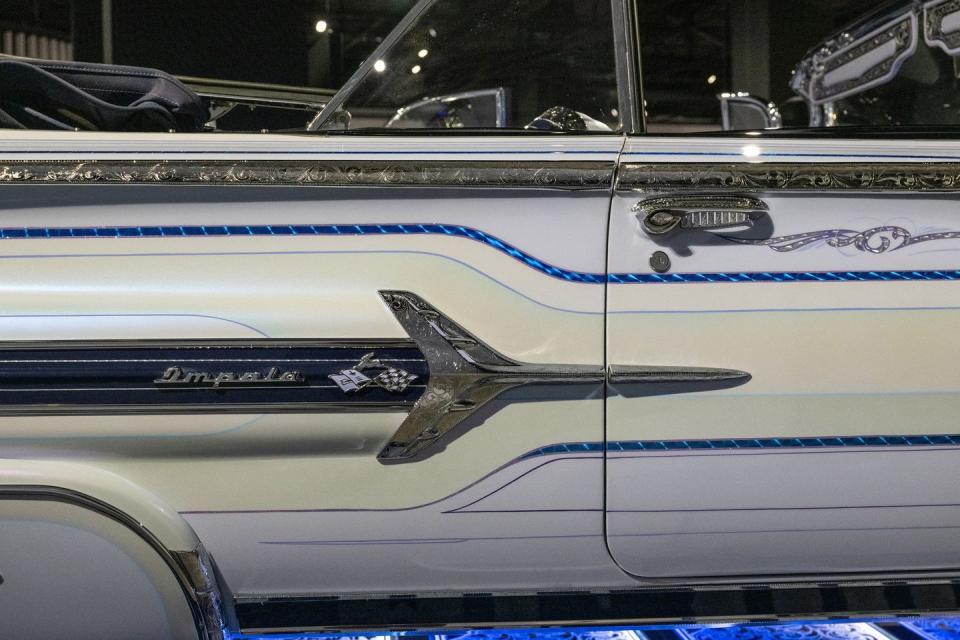
While big '50s and '60s coupes are the traditional starting point for lowriders, any vehicle can get the treatment.
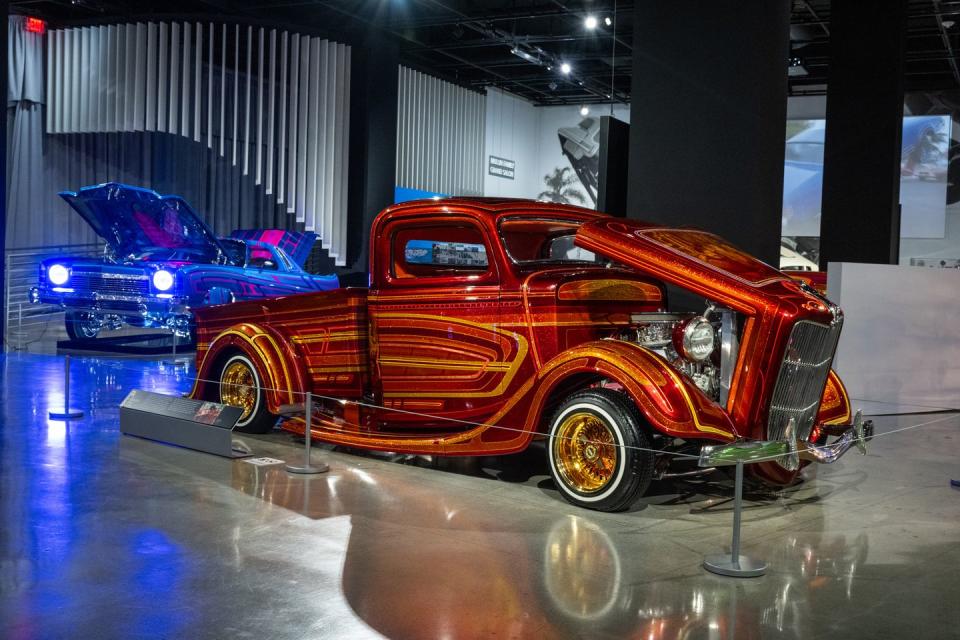
This here is lowrider royalty, "Gypsy Rose," a 1964 Impala that might be the most famous lowrider in the world.
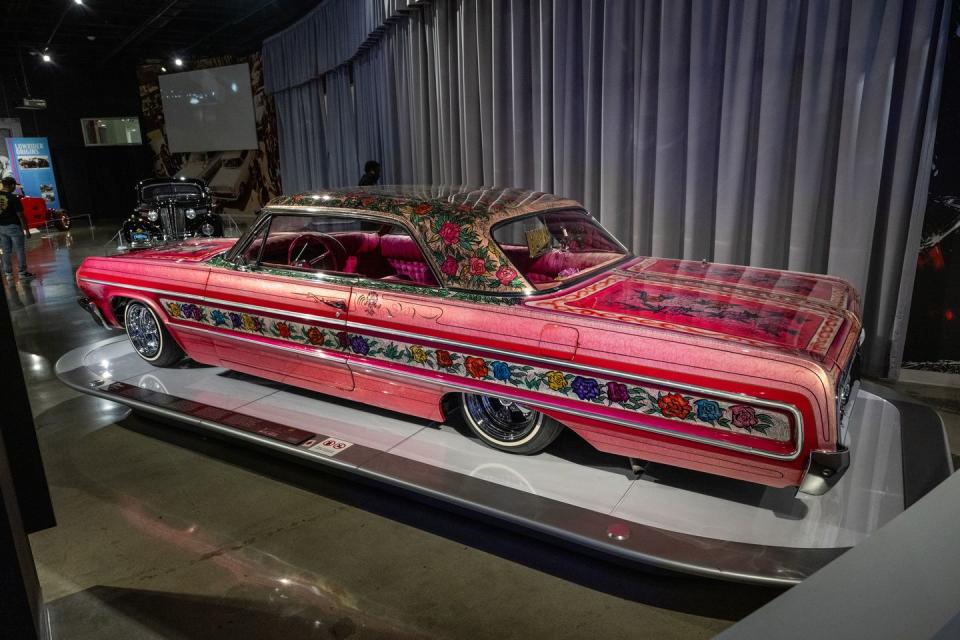
"Gypsy Rose" was owned by Jesse Valadez, founder of Imperials Car Club in East Los Angeles. This version is the third to wear the name, and the only surviving example. The car grew a following both for itself and lowriding when it stole the show in the opening credits of Chico and the Man (1974–1978).
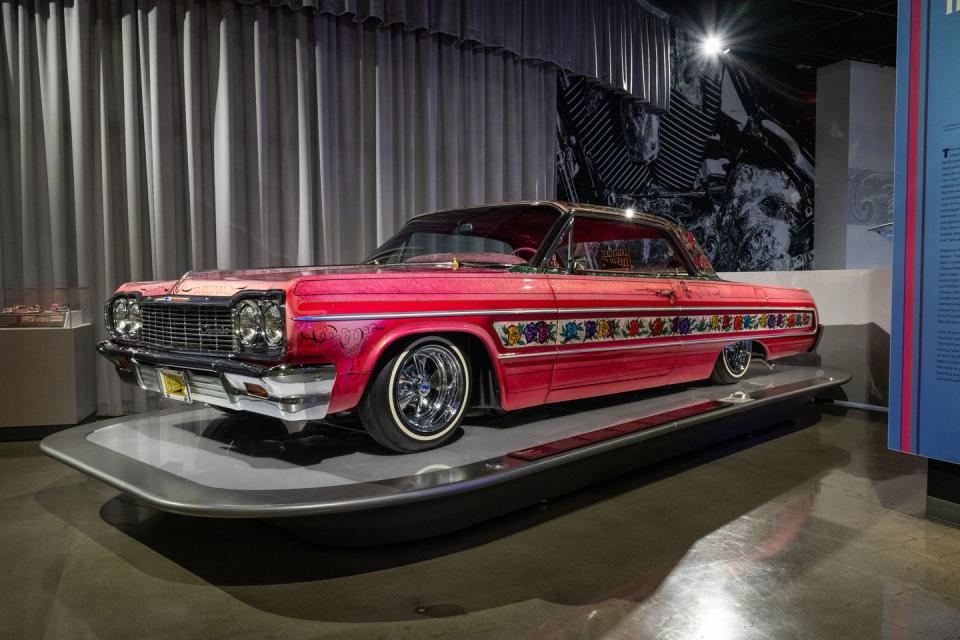
The interior set the bar for future lowrider builds with crushed velvet upholstery, chandeliers, and a literal bar. It seems almost understated compared to the more modern builds in the show, but at the time of its creation, "Gypsy Rose" was several steps above what anyone in the scene was attempting.
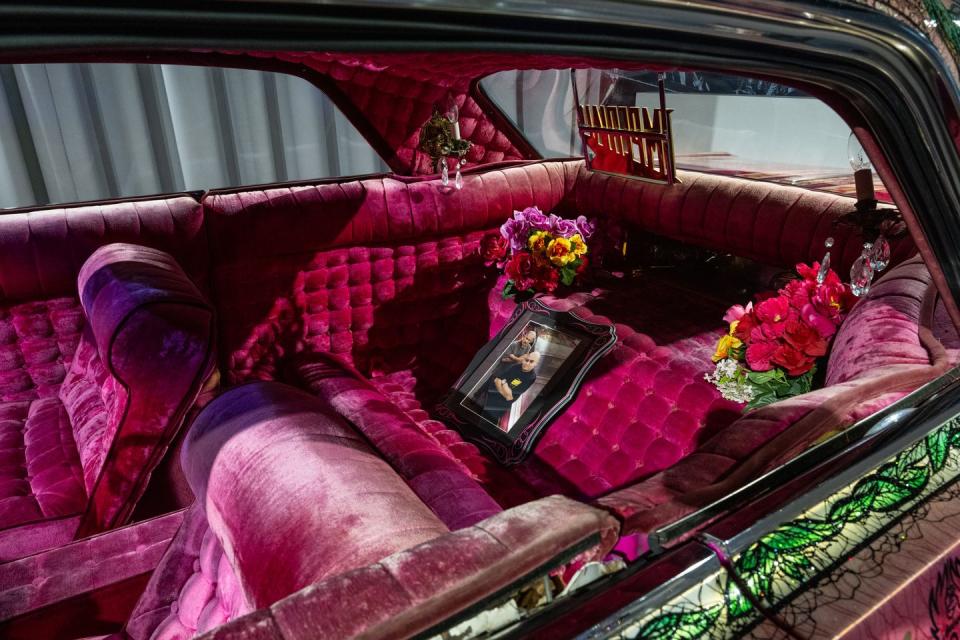
Painted by Walt Prey and Don Heckman, "Gypsy Rose" features more than 100 of the flowers over its candy paint. Heckman was at the event and told me his mother gave him and Prey her embroidery patterns from which they created the stencils for the Impala's flowers.
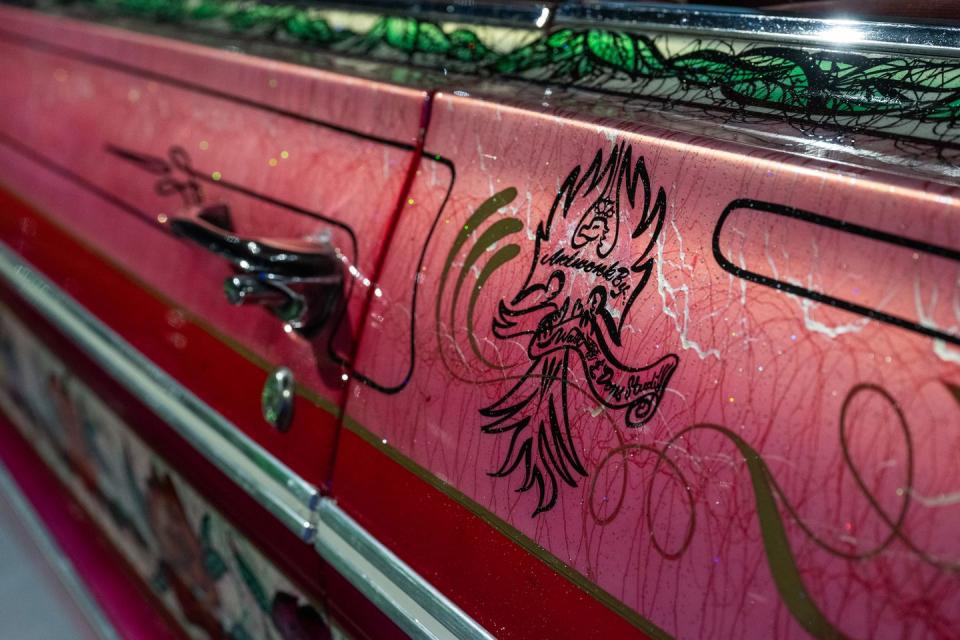
Rose details. "We made leaf stencils out of cardboard, then you go in with an airbrush for the details," says Heckman.
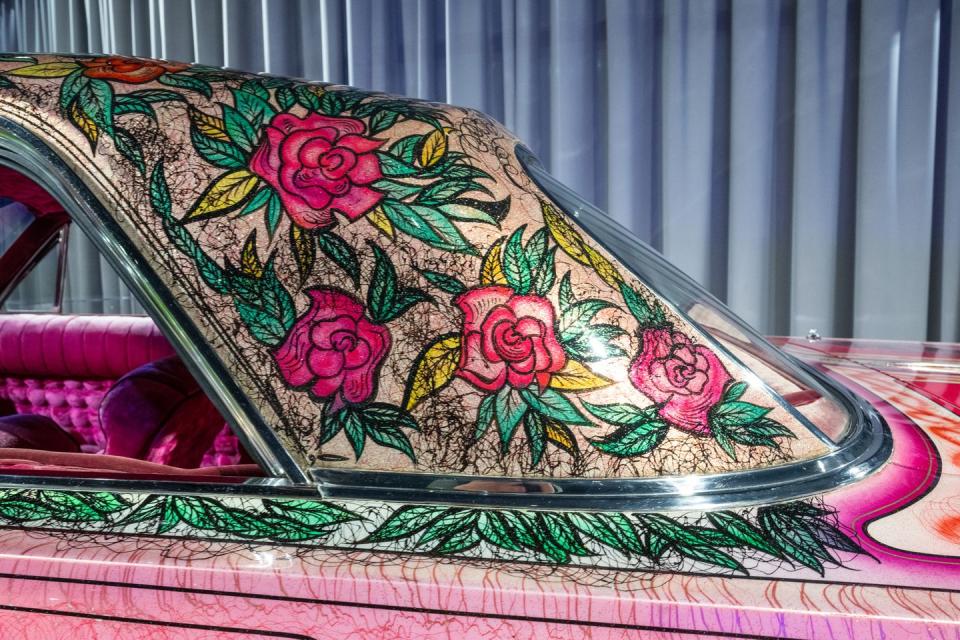
The most surprising thing we learned from Heckman is that the car was originally red candy, and in a few low corners you can see how much darker it once was. The pigments have faded to the famous pink that we see today, and almost white at the tops of the fenders.
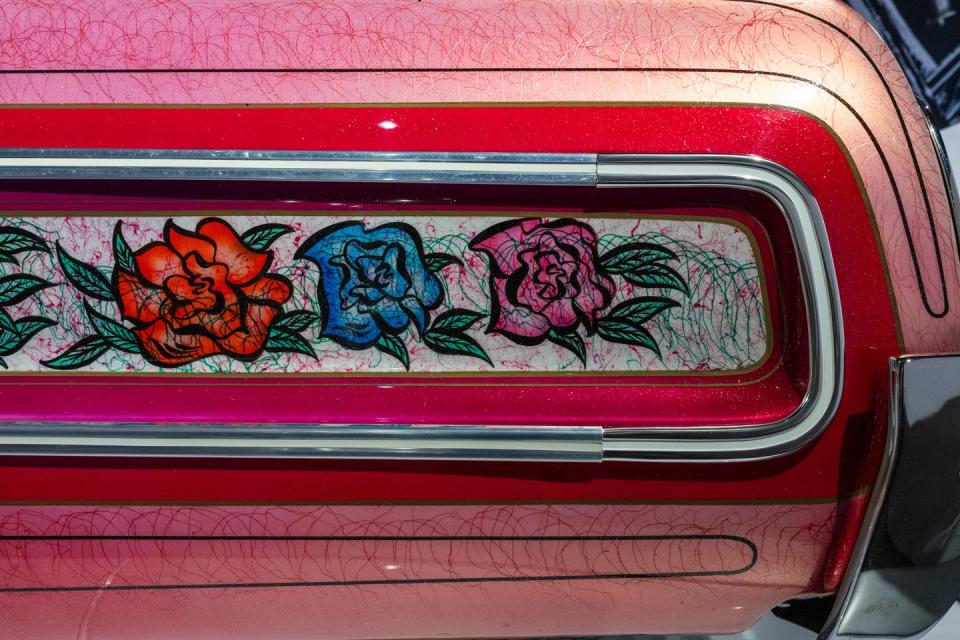
While the show highlights some of the top builders in the world, local lowriders also had a chance to show off under the somewhat cloudy LA skies.
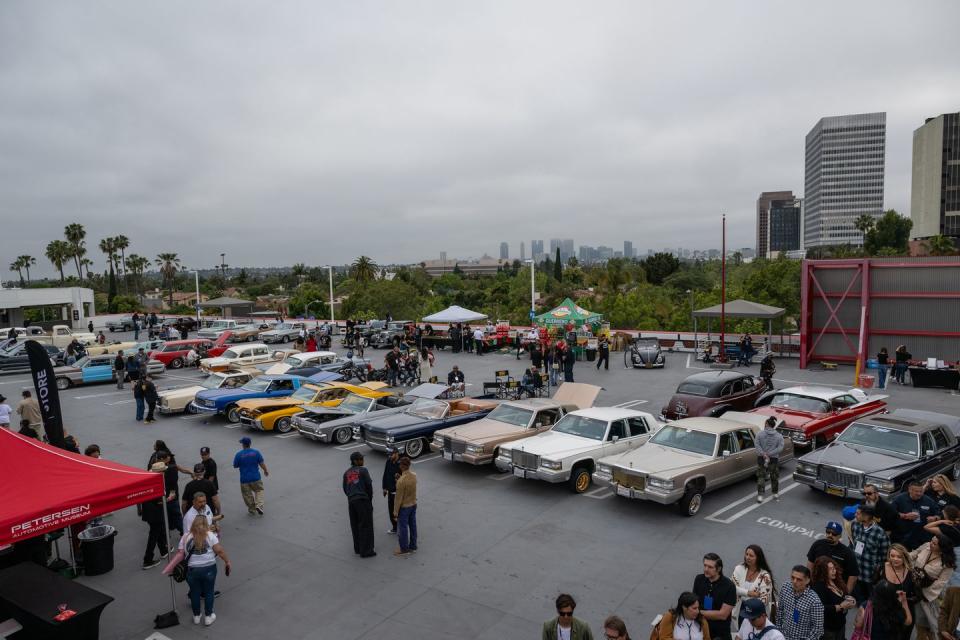
There were some unexpected machines in the car show, like this '70s Dodge Dart.
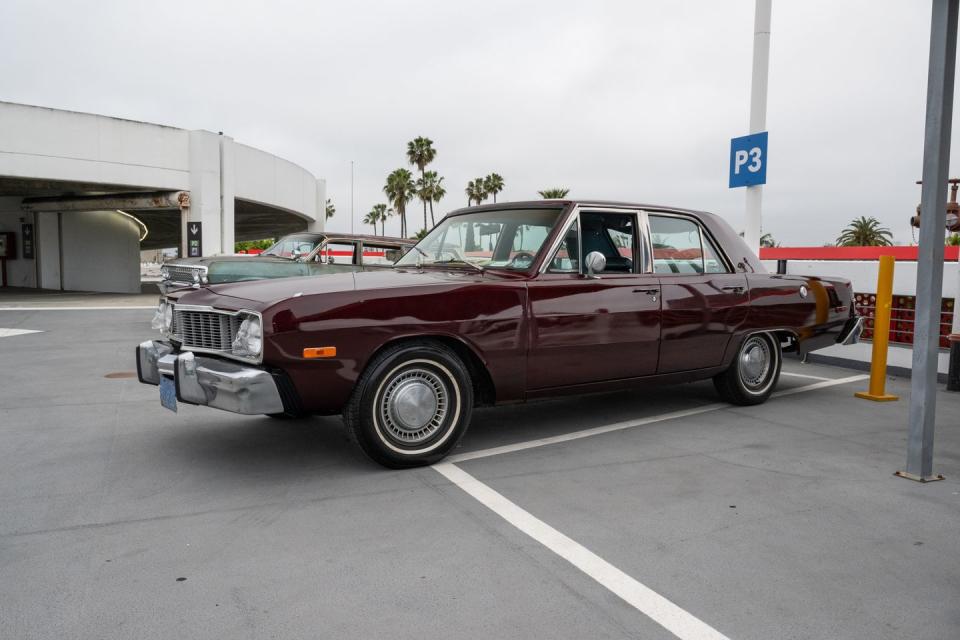
These must look so cool all lit up.
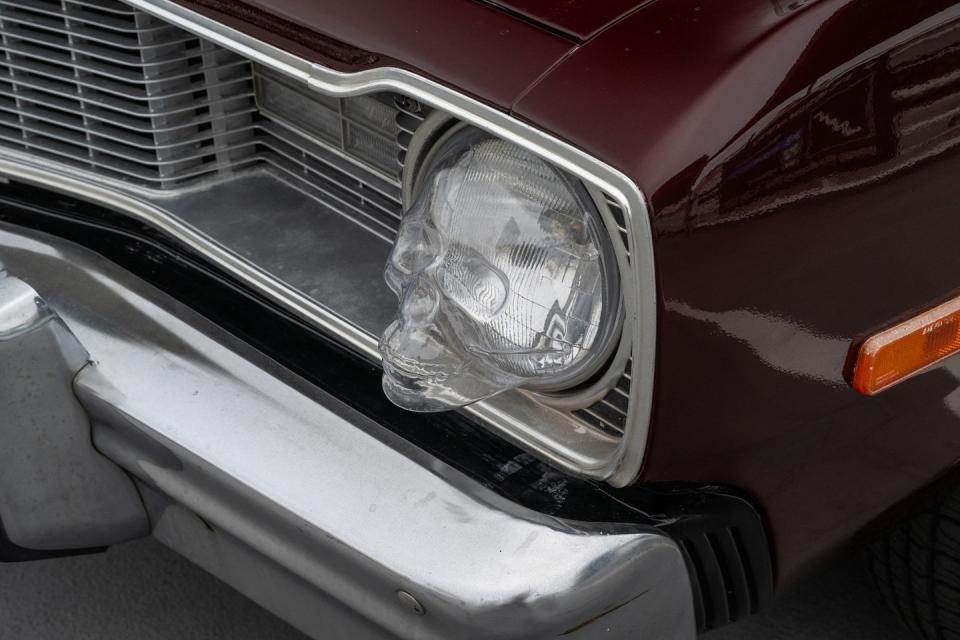
If you just stuck enough friends in the back you could get this stance without airbags.
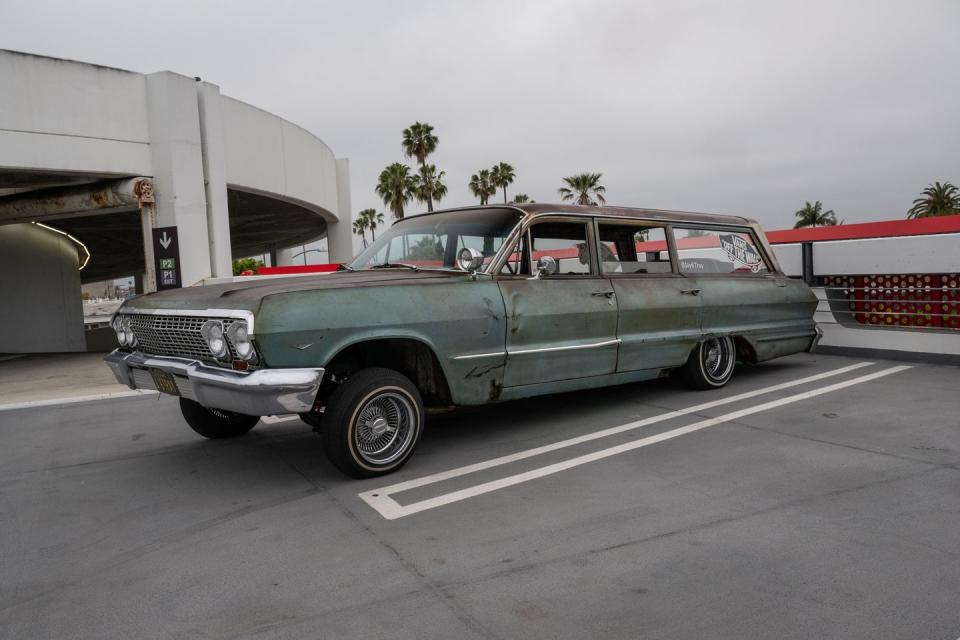
This guy looks like he's been on some journeys.
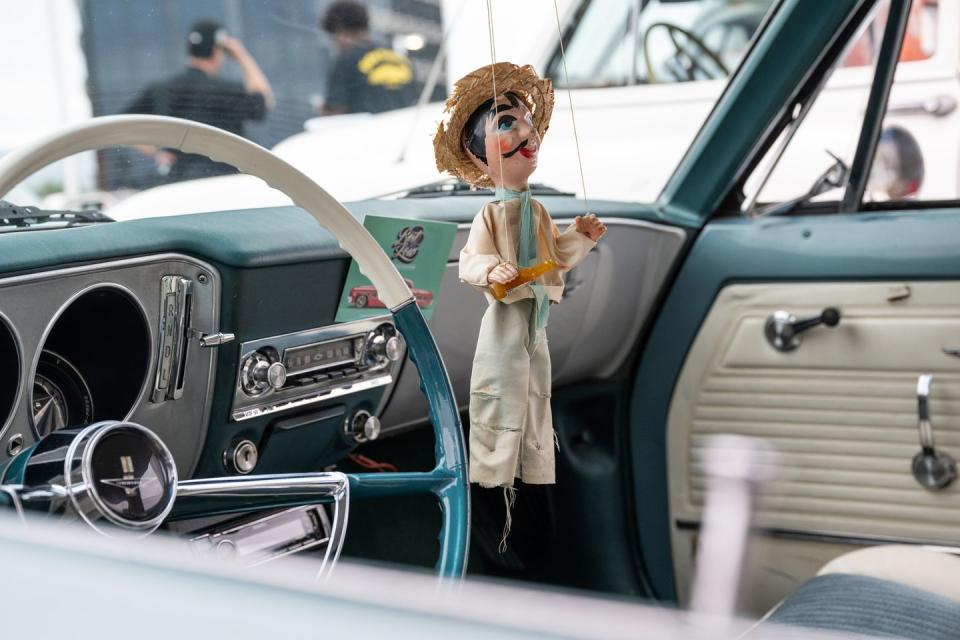
It's a heavy-Chevy-heavy crowd.
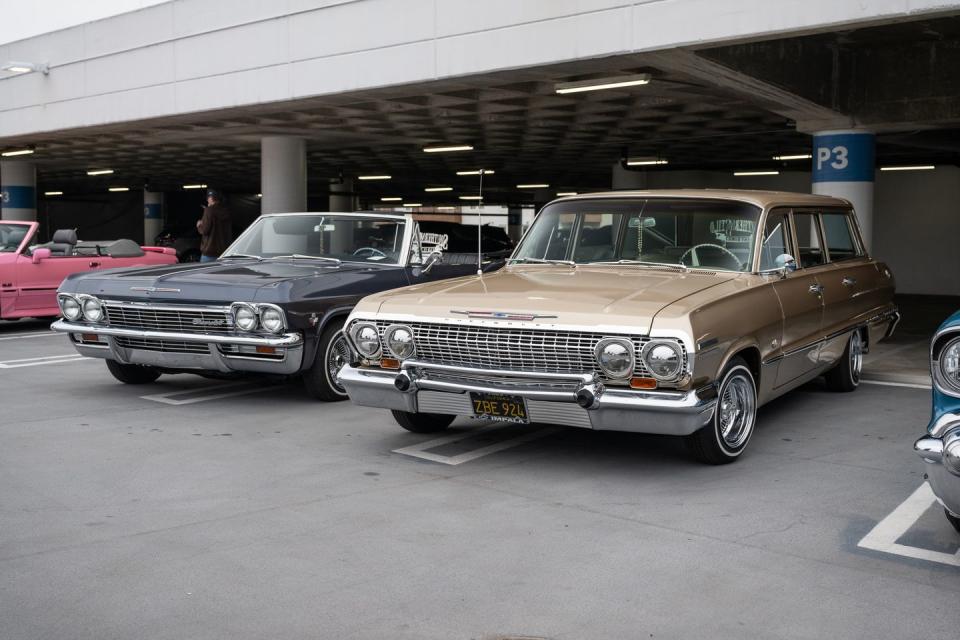
But not all Chevrolet.
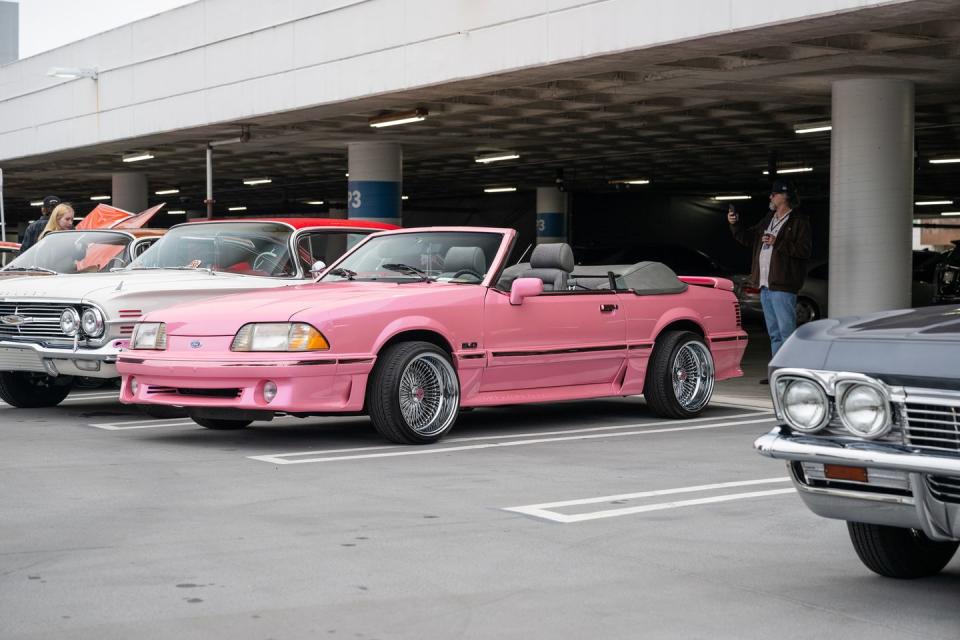
Car clubs announced themselves with chromed badges.
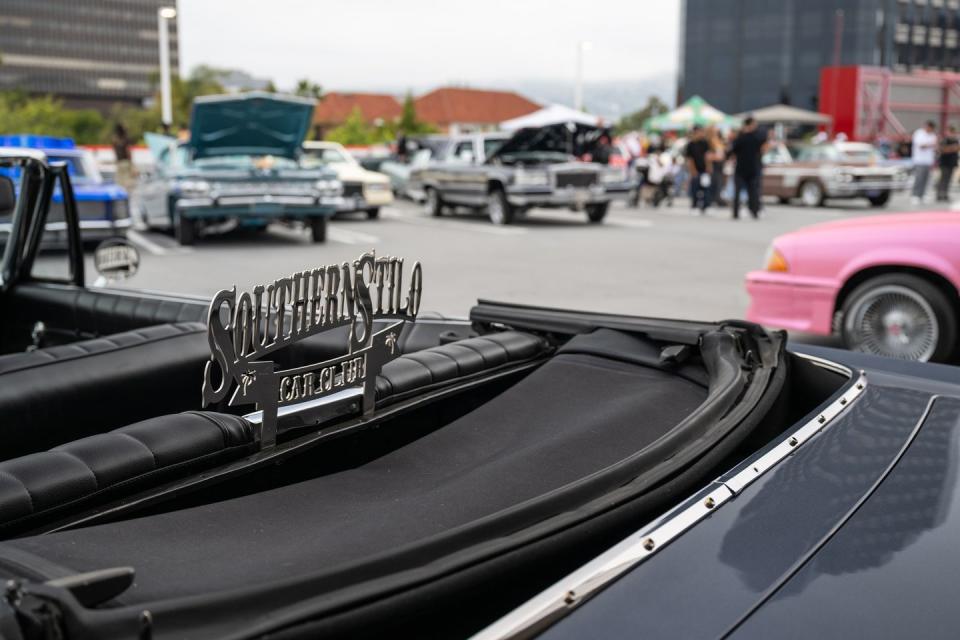
Feeling lucky?
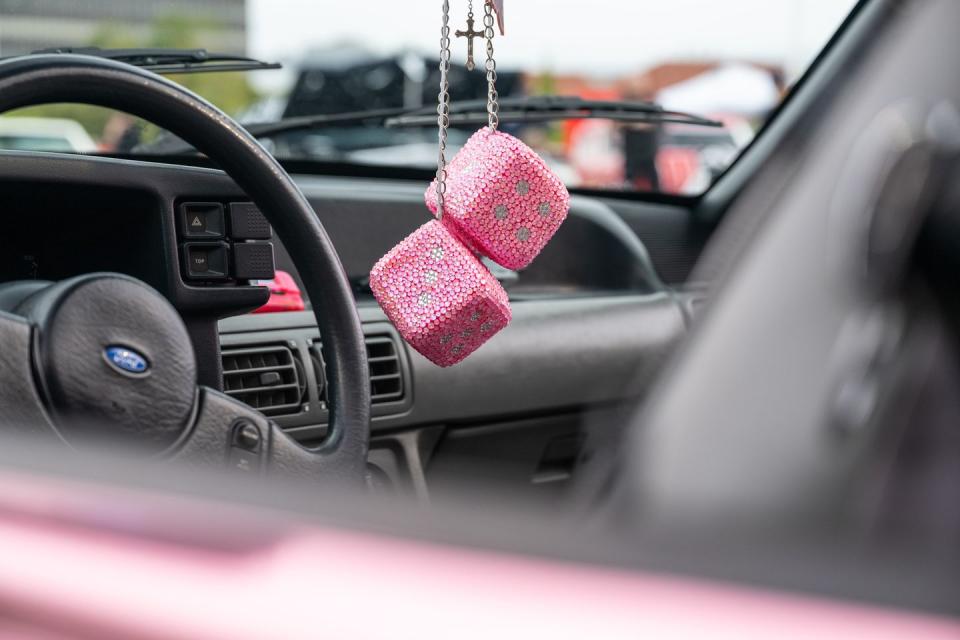
Get some glitter on.
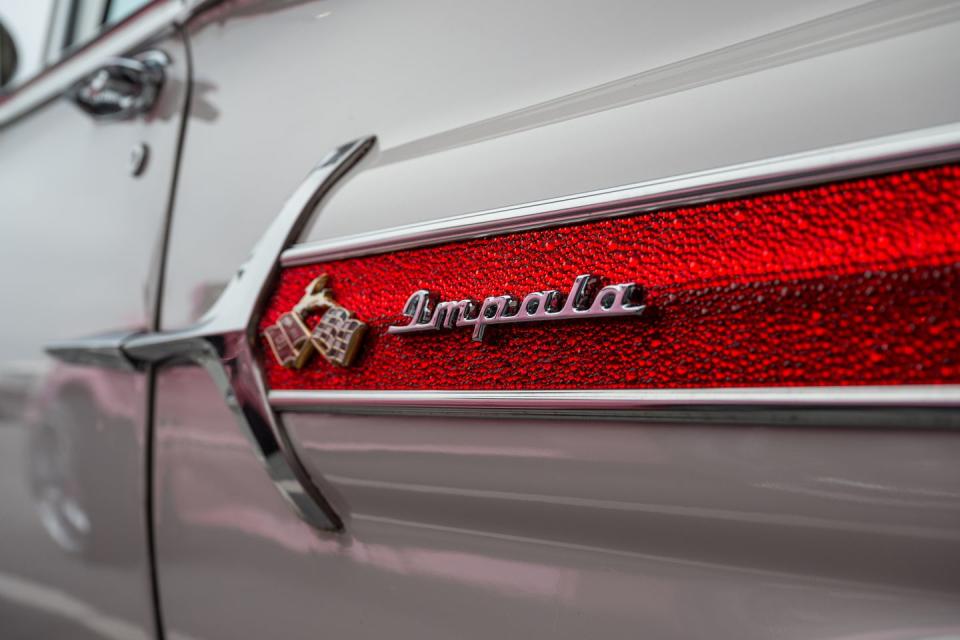
The entire roof, dash, and console of this Impala were completely bedazzled.
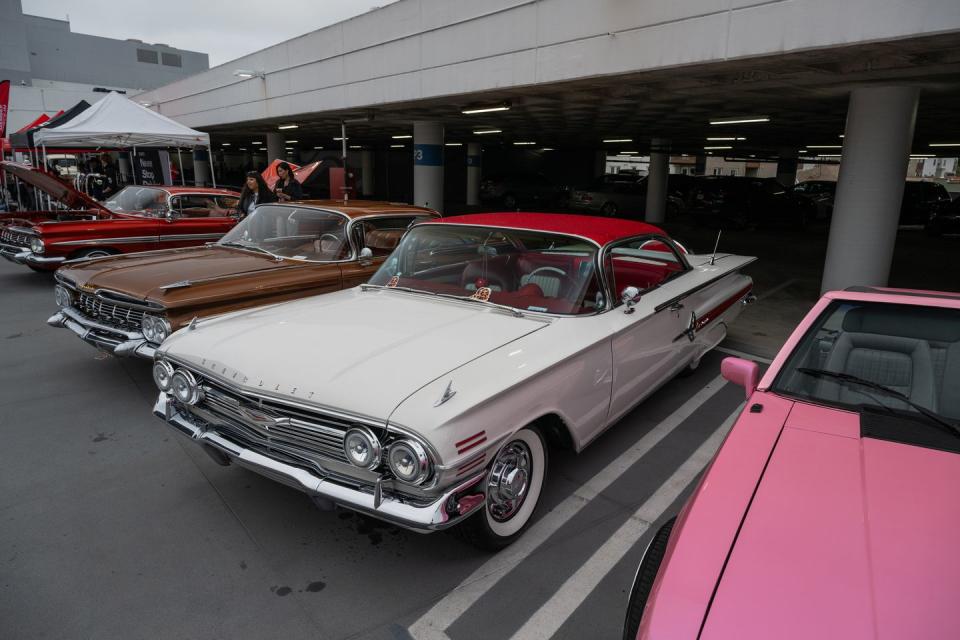
Shine on, crazy diamond.
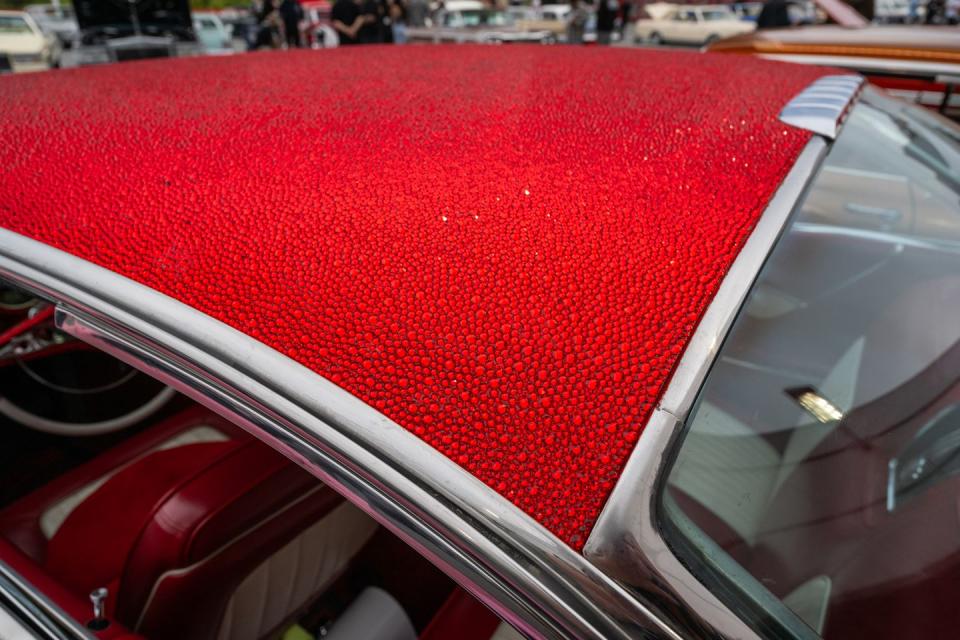
Kiss kiss, bang bang.
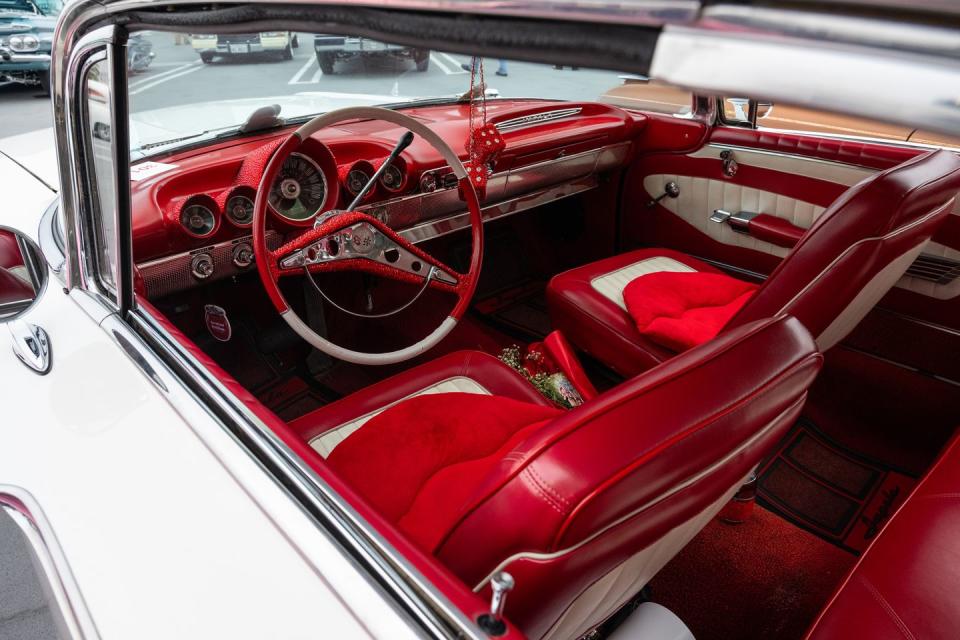
Chin up.
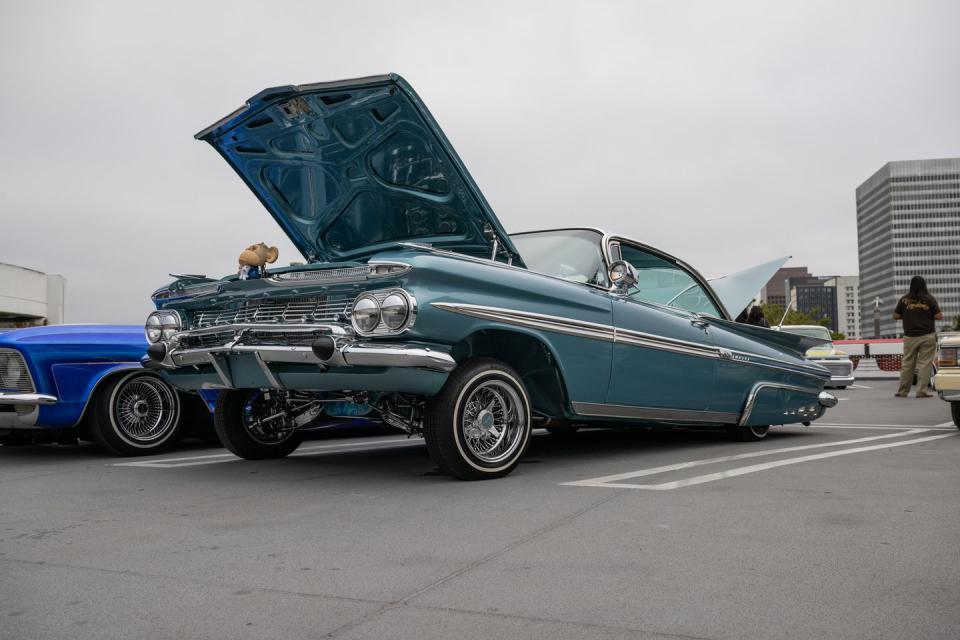
Engraving in the wild.
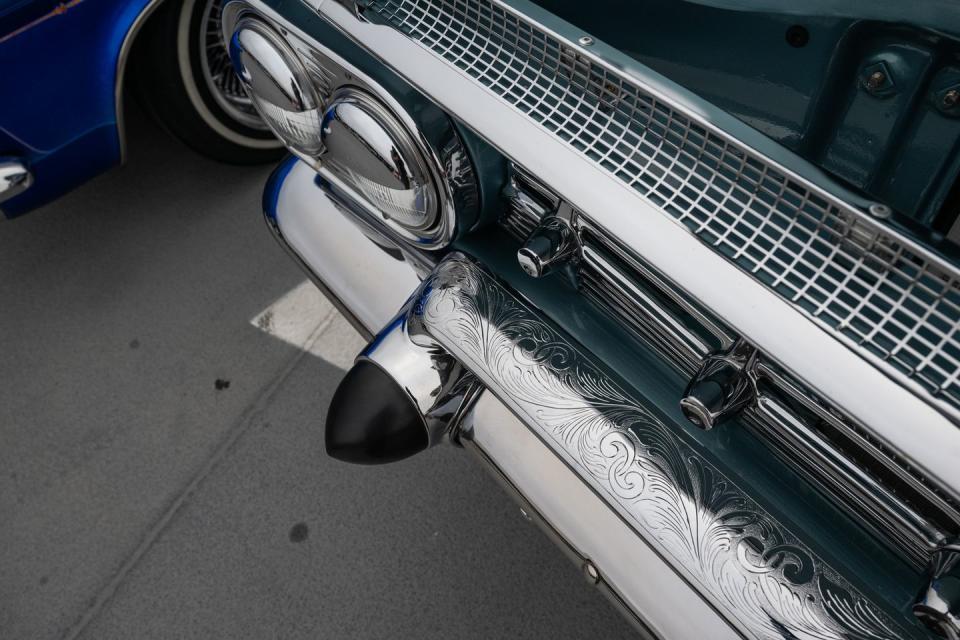
Engines don't get as much attention in lowriders as they do in hot rods, but that doesn't mean they aren't dressed up and amped up.
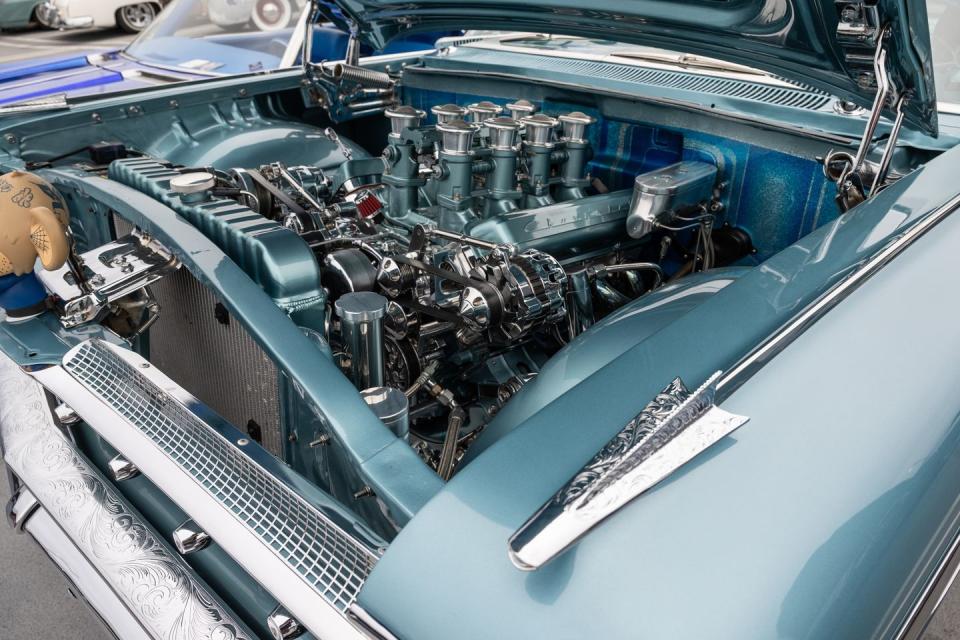
Never let them catch a piece unpolished.
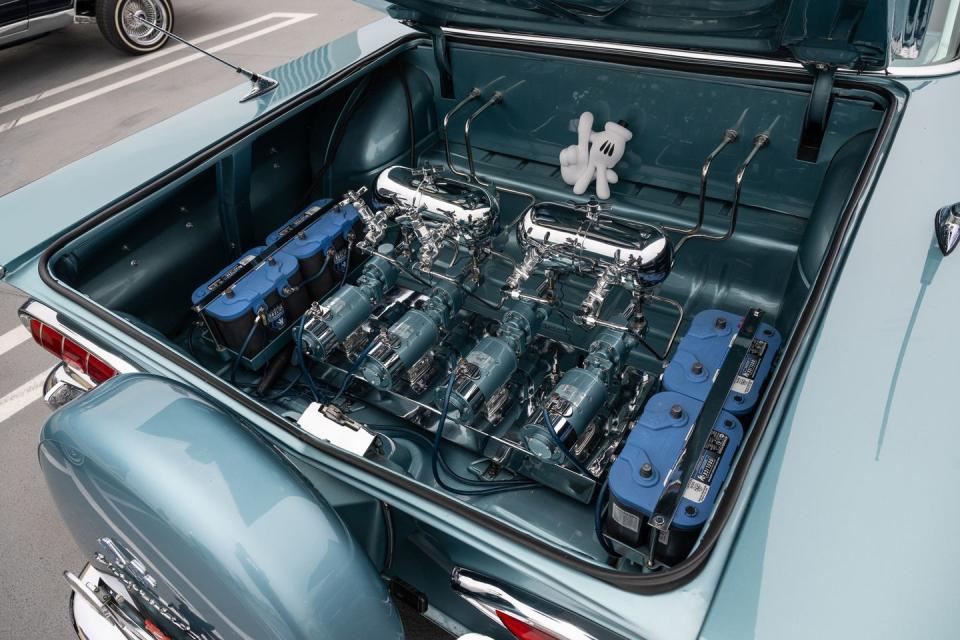
Announce yourself.
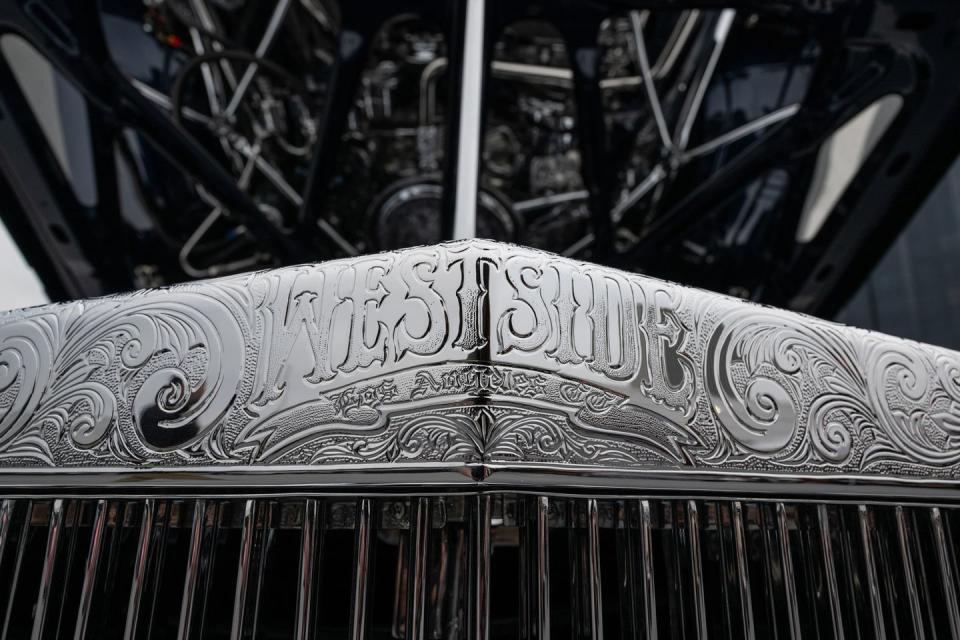
The big cars weren't allowed to bounce on the museum roof, but the little ones could.
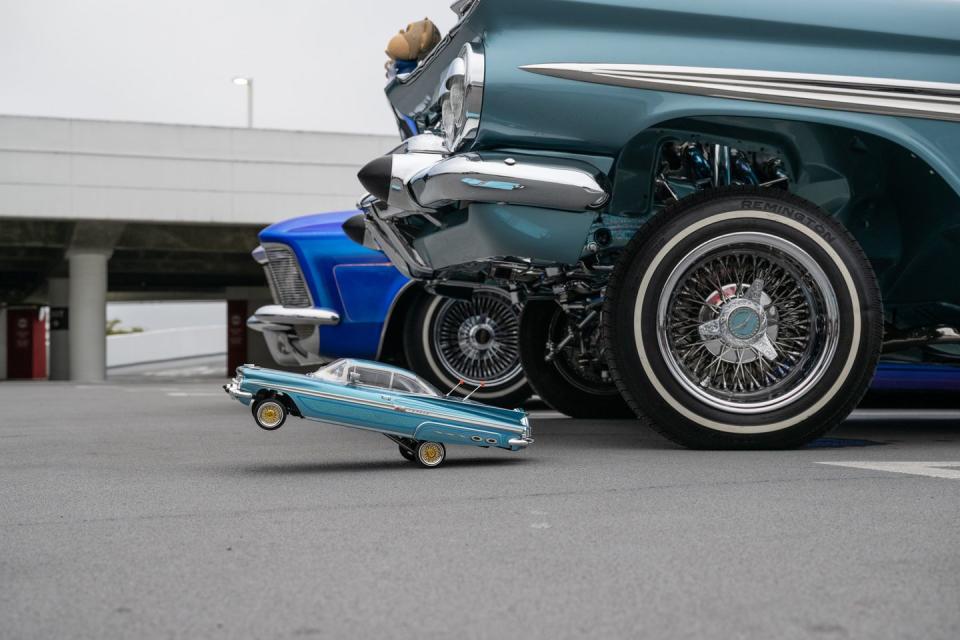
Making the rounds.
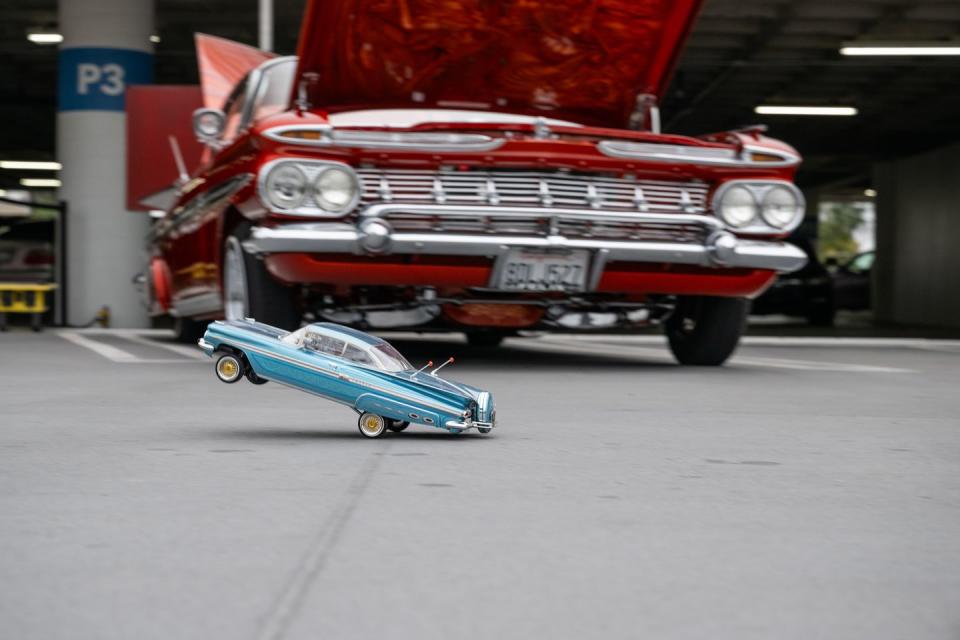
It's the aesthetic choices that set each car apart.
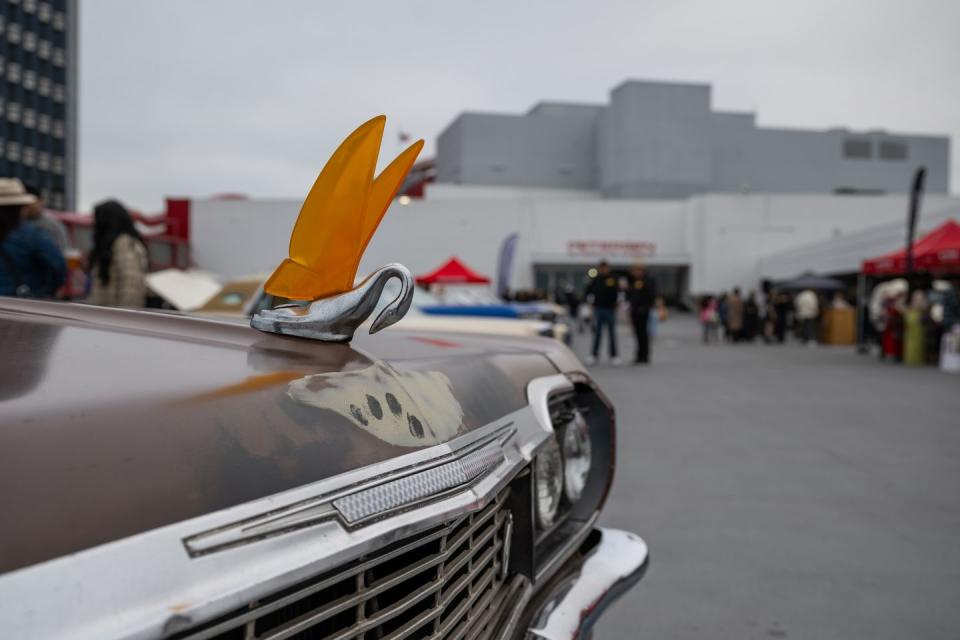
Lock it down.
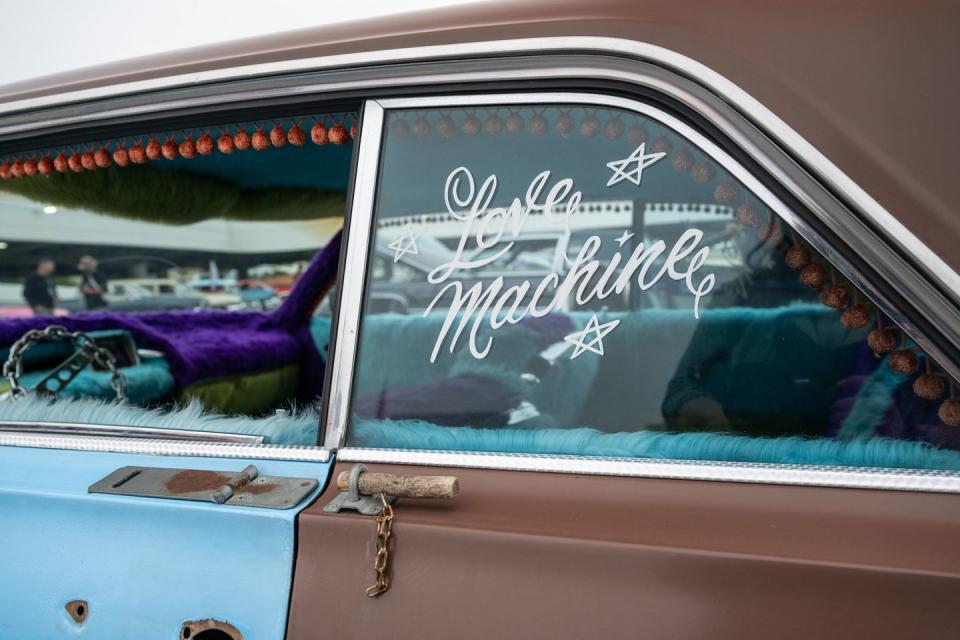
Some team mascot died for this.
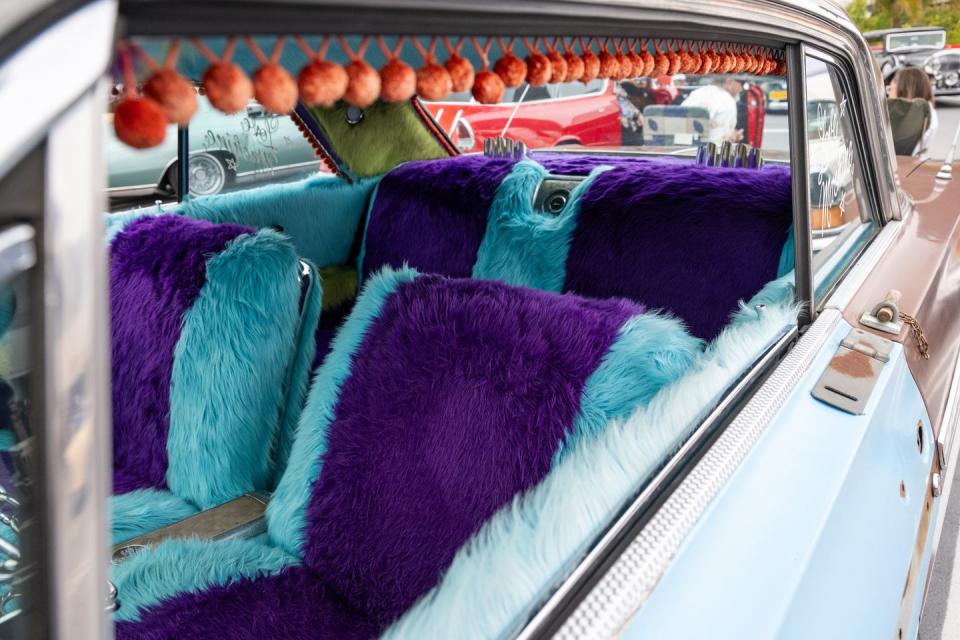
An intimidating trio.
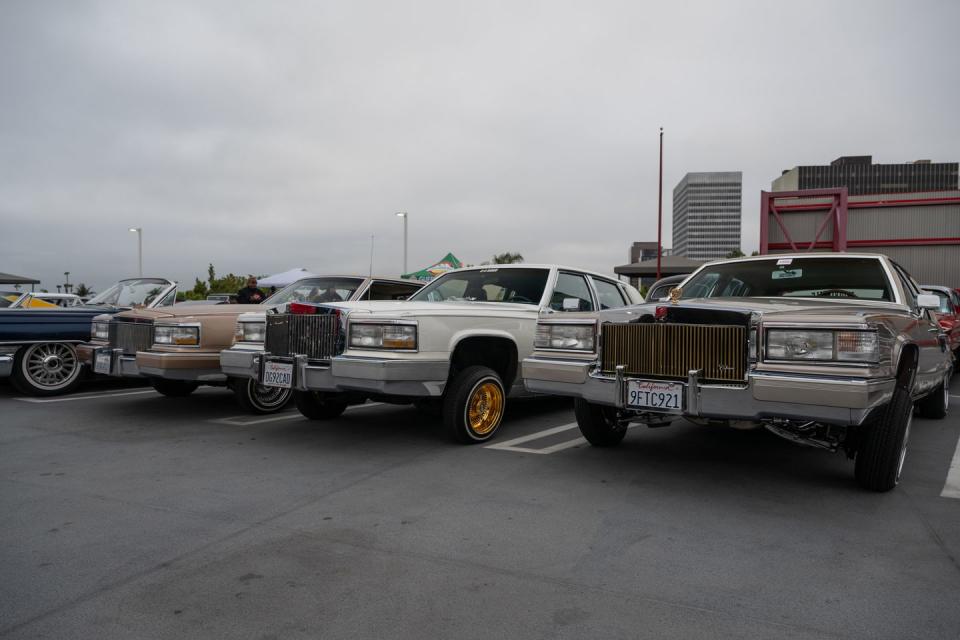
So many hitchhikers.
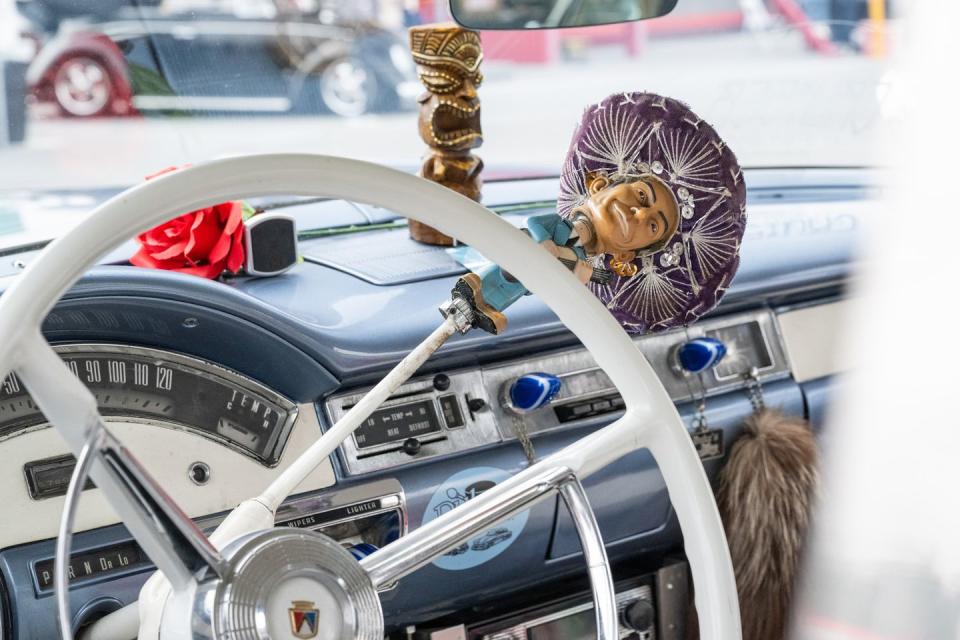
Anything can ride low.
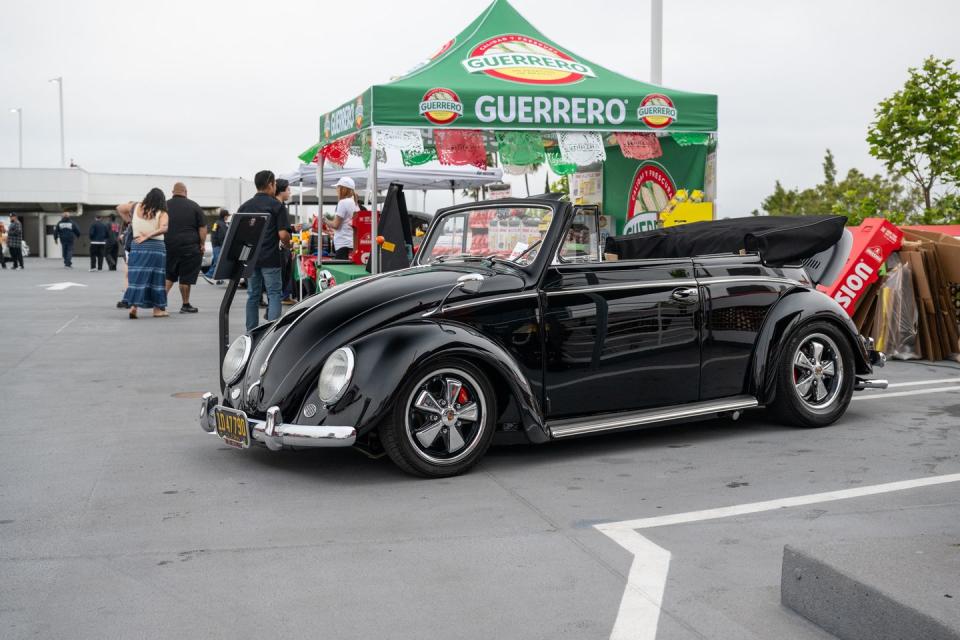
You Might Also Like

 Yahoo Autos
Yahoo Autos 